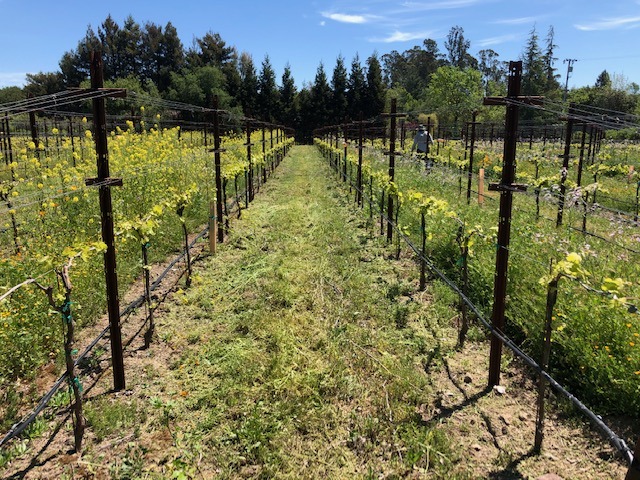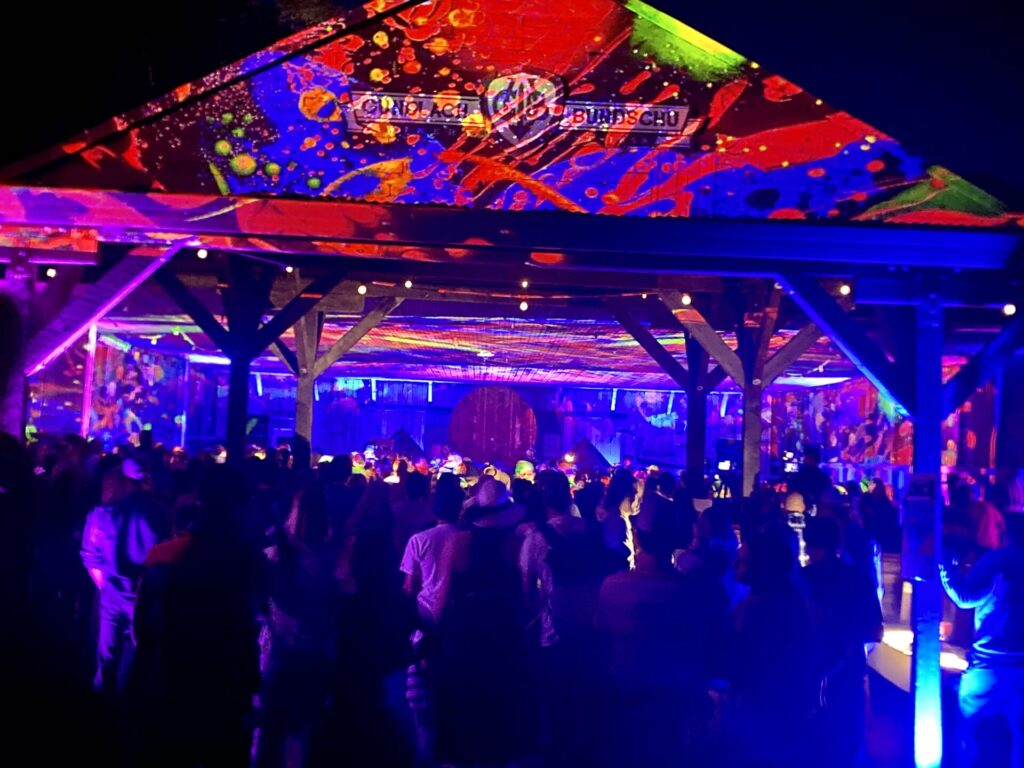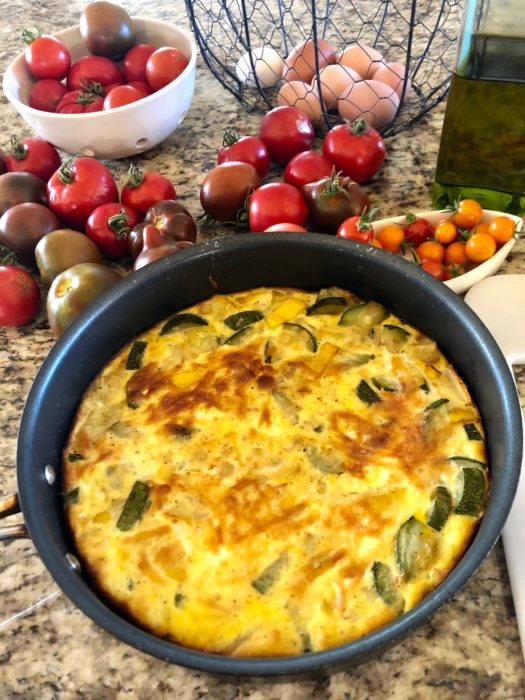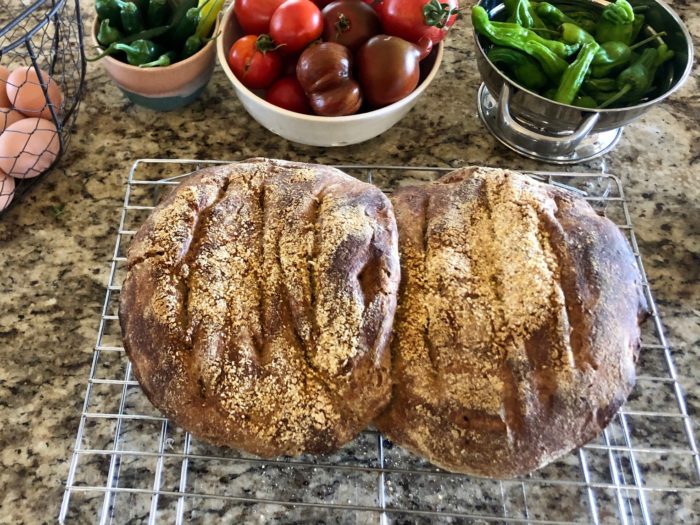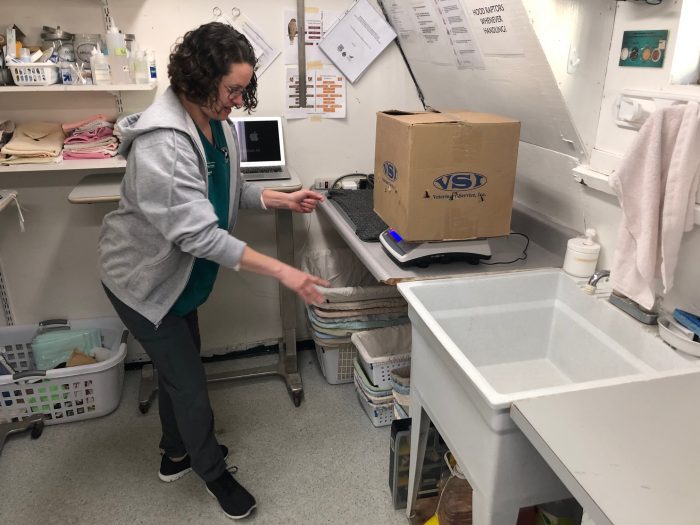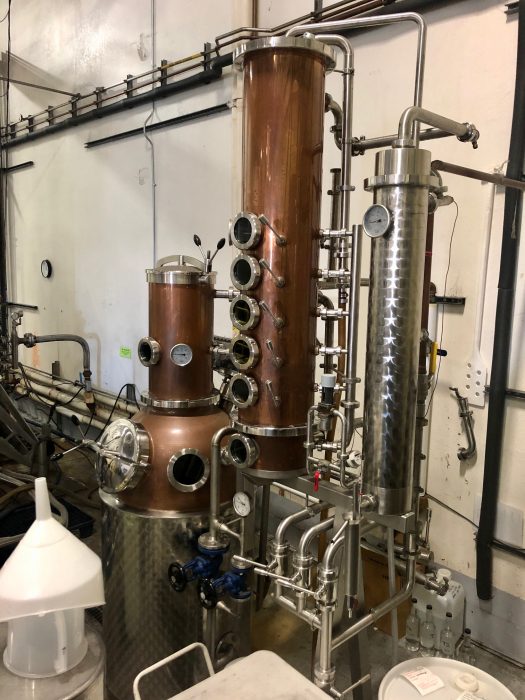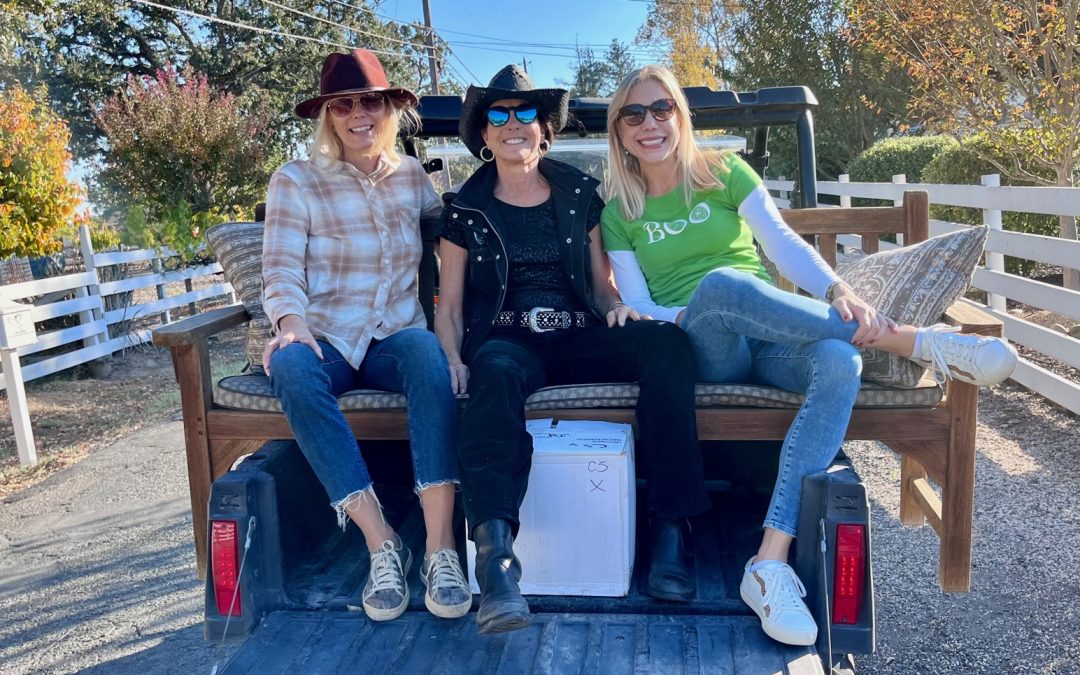
Nov 30, 2022 | Sonoma lifestyle, agave, Hydeout Sonoma, Sagrantino, Sonoma, Sonoma Farming, Sonoma harvest 2022, Sonoma Valley, tequila, things to do in Sonoma
What happens in Sonoma when the harvest is done?
The very last tank of grapes has finished fermenting. The tank is drained of wine and placed in barrels (that liquid is called the “free run”). Then the remaining fermented grapes in the tank are moved into the press and gently squeezed (and the result is called the “press fraction”). And what’s removed from the press after pressing (called the “pomace”) is either sold as animal feed or recycled into green waste or sent to our distiller and turned into Grappa, Brandy, and Cognac; and the seeds are further pressed into grapeseed oil. And that really marks the end of the harvest season.
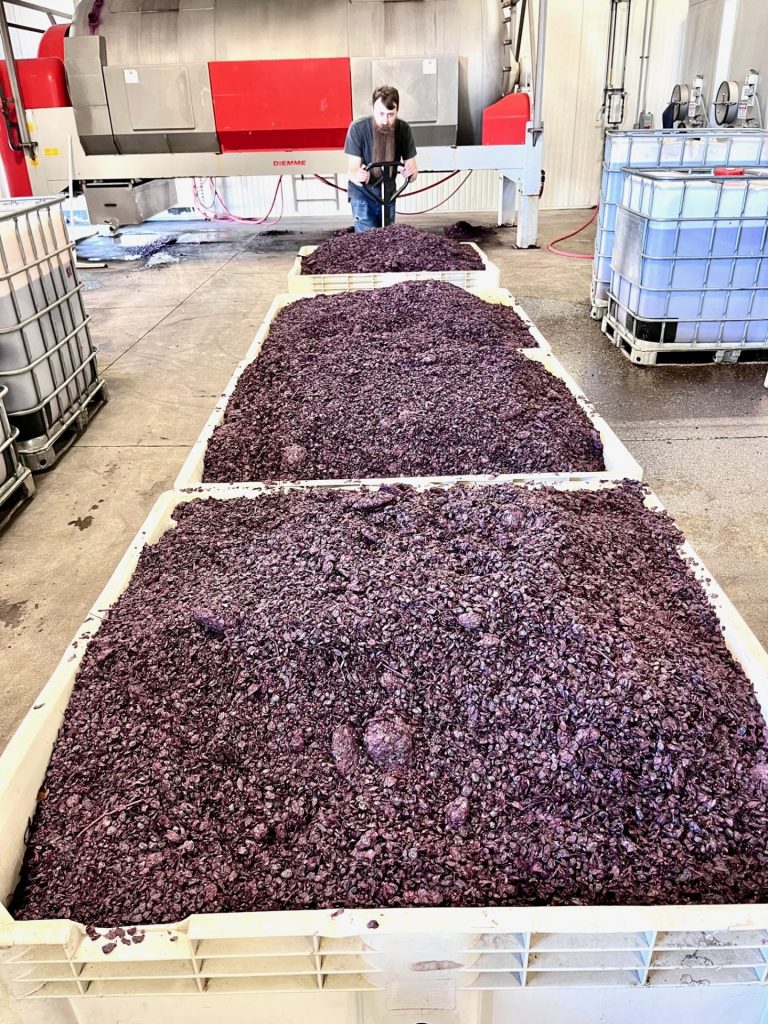
This is what 2 tons of dense Syrah grape pomace looks like when it comes out of the press. It’s dark purple and bone dry. The very last cuveé of wine has been barreled.
There still remain some chores to manage over the winter: the newly filled wine barrels will be carefully monitored as the secondary Malo-Lactic fermentation is monitored and managed (and where the tart Malic acid, think green apple, is slowly fermented into Lactic acid, with potential health benefits including improved gut health, immune system support, and antioxidant effects). Barrels must be topped off due to evaporation. And as the wine settles we need to taste every wine to assure things are coming along to our liking. And, we start thinking about which of the older wines need to be prepared for bottling this spring. Last, now is the time for the winery to be thoroughly cleaned from top to bottom. And only then will it be time for everyone to have a much needed rest.
A brief note about the 2022 season: It started off with a really hard freeze right as many grape varieties were just budding out. There was some damage to some vineyards resulting in crop loss as much as 50%. Then after a normal but very dry summer, the record heat wave struck, 5 days over 100F and 5 nights in the 80F’s putting extreme stress on ripening fruit. And then adding insult to injury, 2 inches of rain. It was one of the most confounding and complicated growing seasons ever. More on that when the 2022’s are ready for release in 2024.
Halloween
Halloween is usually the first sign that the wonderful long slog that is harvest and winemaking is about to wrap up. When bright orange pumpkins start appearing all over town, we know the harvest season is almost over.
Chickens
As the cold weather settles in at the Hydeout, the chicken egg production starts to fall off as the chickens shift their energy from egg production to winter feather production. And in our case, they also start flying the coop and hiding their eggs in hilarious hard-to-find places.
Final garden harvest
As is the tradition in the Fall, it’s time to harvest the last of the garden produce, clean it up, and pickle it all in bell jars.
Wood slab table – restarting an old project
In 2020, St Helena in Napa Valley was surrounded by the Glass fire. Acres of gorgeous oak forest was lost. With help from friends, I located and set aside one of the fallen oaks and had one of the fire department crews mill it into oak slabs for me. The new table from this project will go into the new winery barn here at the Hydeout.
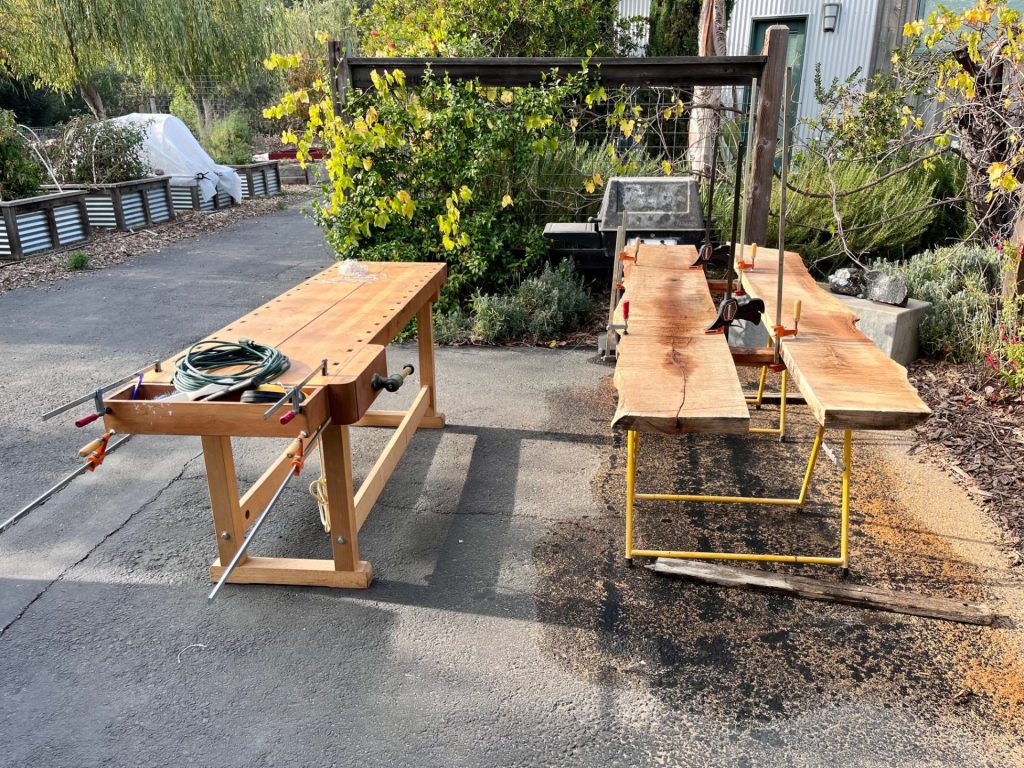
Two oak slabs, about 10 feet long and 18 inches wide, will be joined along the inside edges to form a new table. The outer live-edges still show the burn scars from the fire. It is a stark reminder of how the fires damaged lives and property.
Margaritas
By the time of the Thanksgiving holiday in late November, winemaking has truly concluded, and our Prickly Pear Cactus flowers are ripe. And that means it’s time for the whole family to get involved in producing our Prickly Pear Agave Nectar. And our tart, sweet, smoky, mezcal Margaritas!
Recipe: Click here!
Living art at the Hydeout
Dear friend, character, bon vivant, and Sonoma artist Jock McDonald, with assistance from his wife Sherry McDowell, set up a photo shoot for a new project Jock is developing called “TRASH.” I can’t say any more at this time as the final form of this new work is on its way to Art Basel in Miami, Florida right now! These are preliminary images only and in no way depict the final art form that Jock has developed. To learn more, click here.
FAMILY
This is the time of year we all gather as family and enjoy another wonderful year of life, trials, tribulations, health and happiness. Here is the entire Hydeout team:
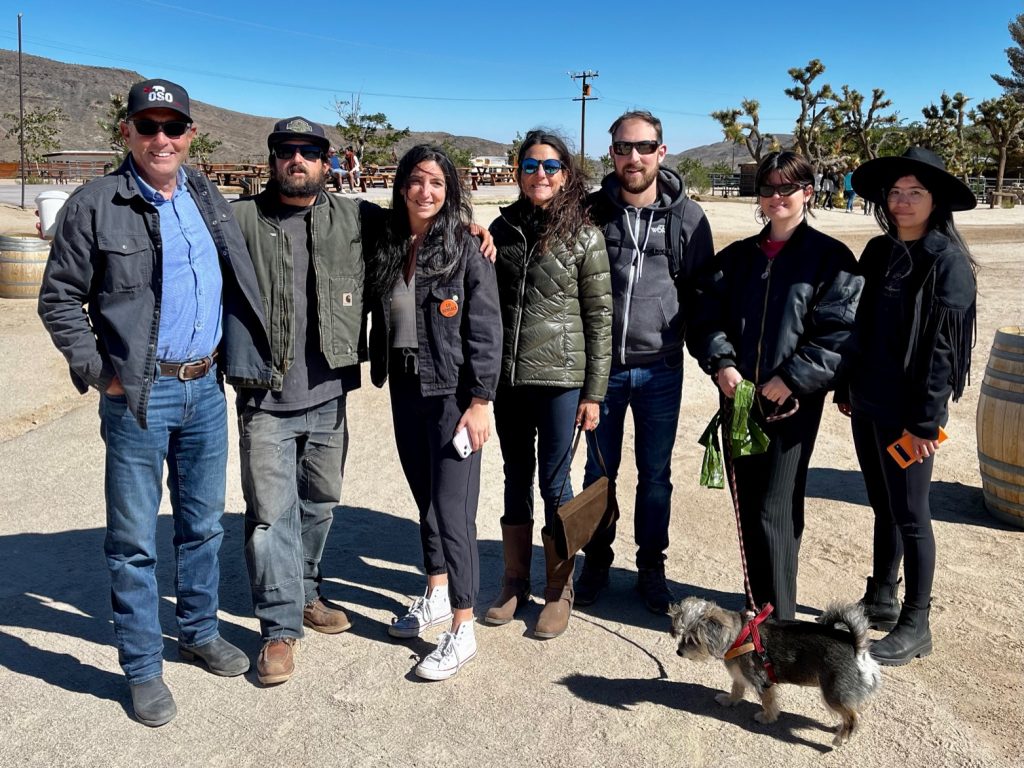
Happy holidays from the entire Wornick family – Ken, Dennis, Sophia, Cynthia, Harry, with Elyse, Jessica, and Tony the dog
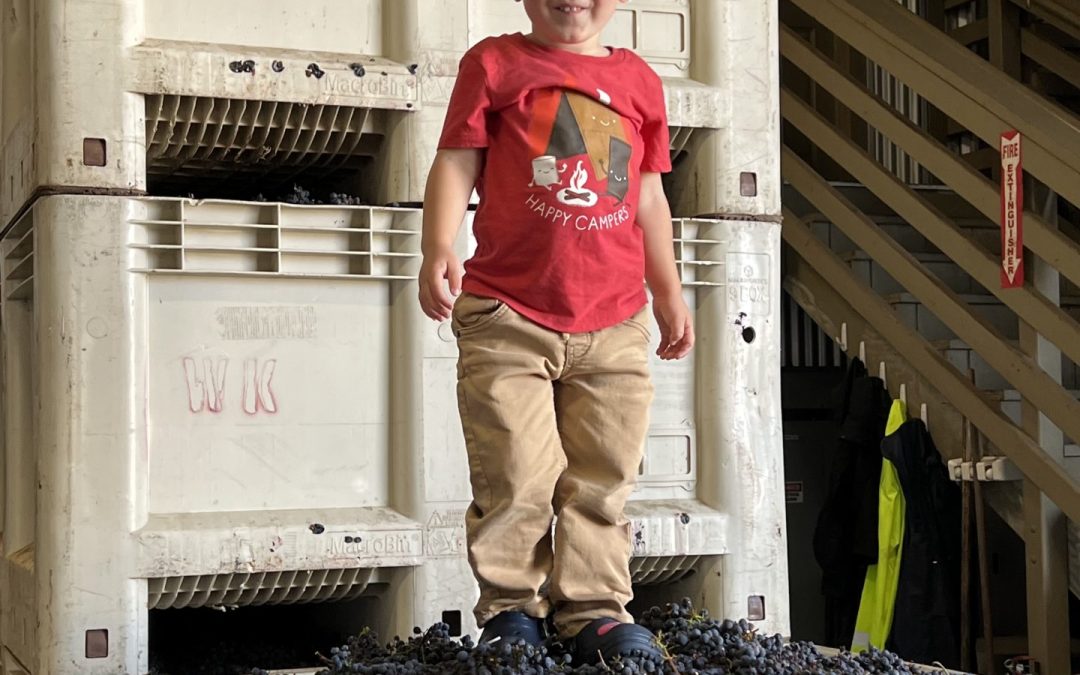
Oct 22, 2022 | Uncategorized, Hydeout Sonoma, Sonoma, Sonoma Farming, Vineyard
Passing the 1,000 blog readers mark, and with my thanks to you all, here are 50+ images from this, my 23rd vintage. – Ken Wornick
Blending trials for bottling aged reds prior to harvest
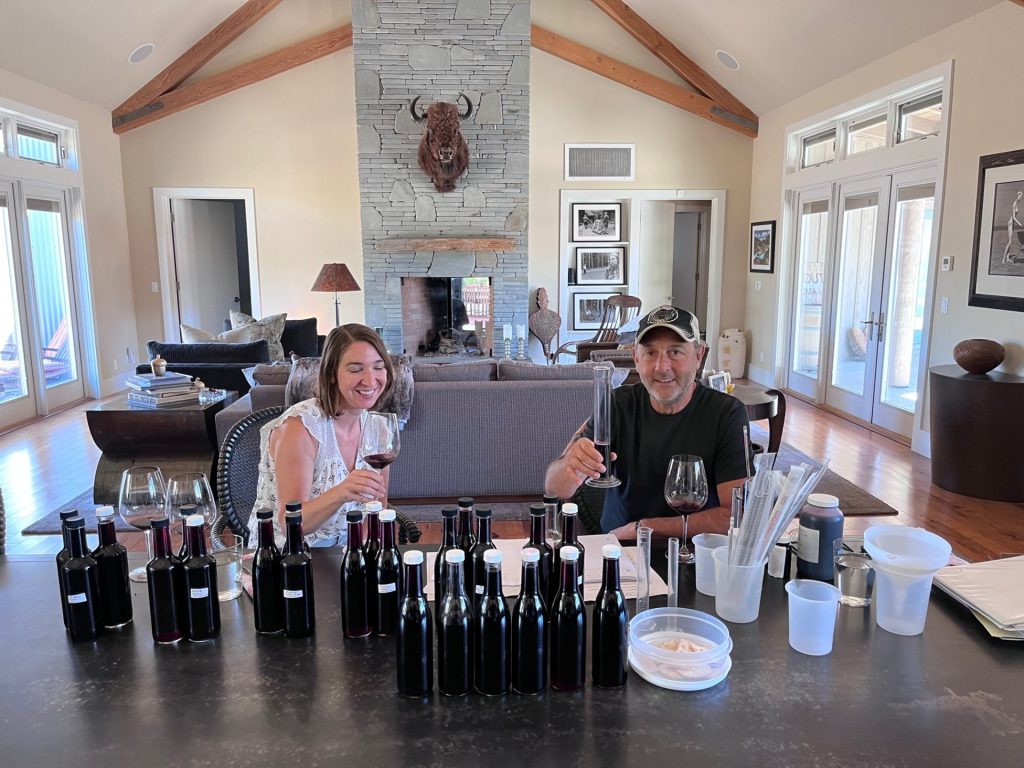
Faith and I needed to plan the bottling of the remaining 2020 client red wines that were still aging in barrels. To get ready, we conducted blending trials for some of our client wines here at the Hydeout Sonoma kitchen table.
Note the grouped samples as source wines, the pipettes and beakers, and so on. We start with the base wines, tasting notes, and lab chemistry in hand. Then we try to imagine what actions will give lift, depth, and longevity to each wine. Blending is a fun process because after spending a year growing the fruit and another year producing and yet another year aging the wines, it is really nice to sit in a warm quiet well-lit place and taste each wine one last time with focus and concentration. And then somehow with a bit of alchemy, create delicious artistry from all of the components.
Bottling
While the 2021 vintage continues to age in barrels, and the 2022 harvest approaches, emptying barrels of perfectly-aged and blended 2020 red wine for bottling also creates needed space in the winery for the incoming 2022 vintage.
One of the best days for what we do is delivering a completed bottled vintage to our clients, sometimes 26 months of waiting! Here are 3 recent examples:
4:00am start on an early morning in August, 2022
Harvest 2022 started for us in mid-August with some client hillside fruit on Arrowhead Mountain in southern Sonoma. What a moment it is every year when we shift from farming, which started way back in January, and finally seven to nine months later the fruit is ripe and we’re ready to harvest.
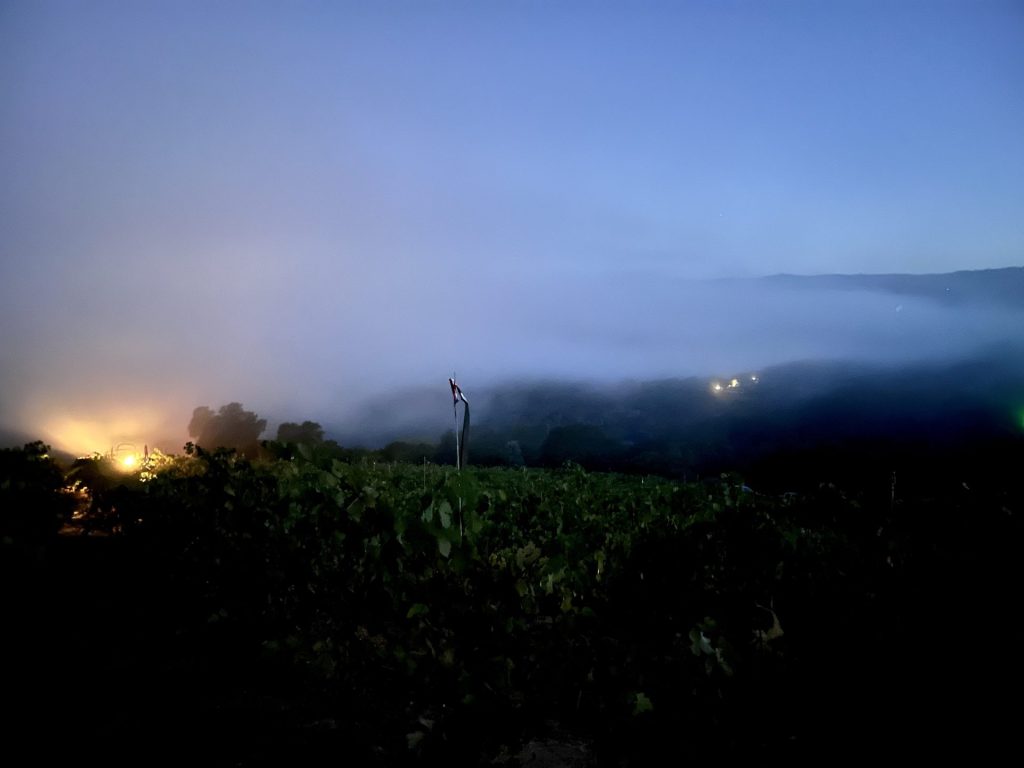
A cool dense layer of fog sits on the valley floor below this vineyard block, as the slowly approaching tractor lights glow in the background
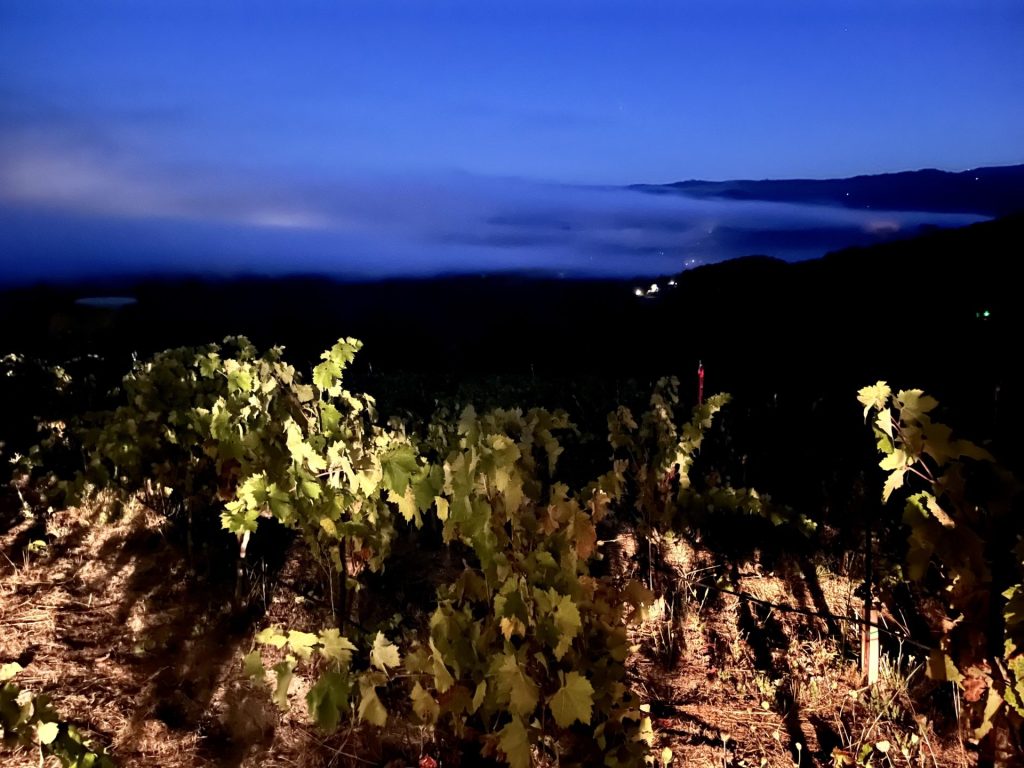
A slight breeze and the fog suddenly shifts as the sun almost rises (note the 3 house lights down below no longer in fog)
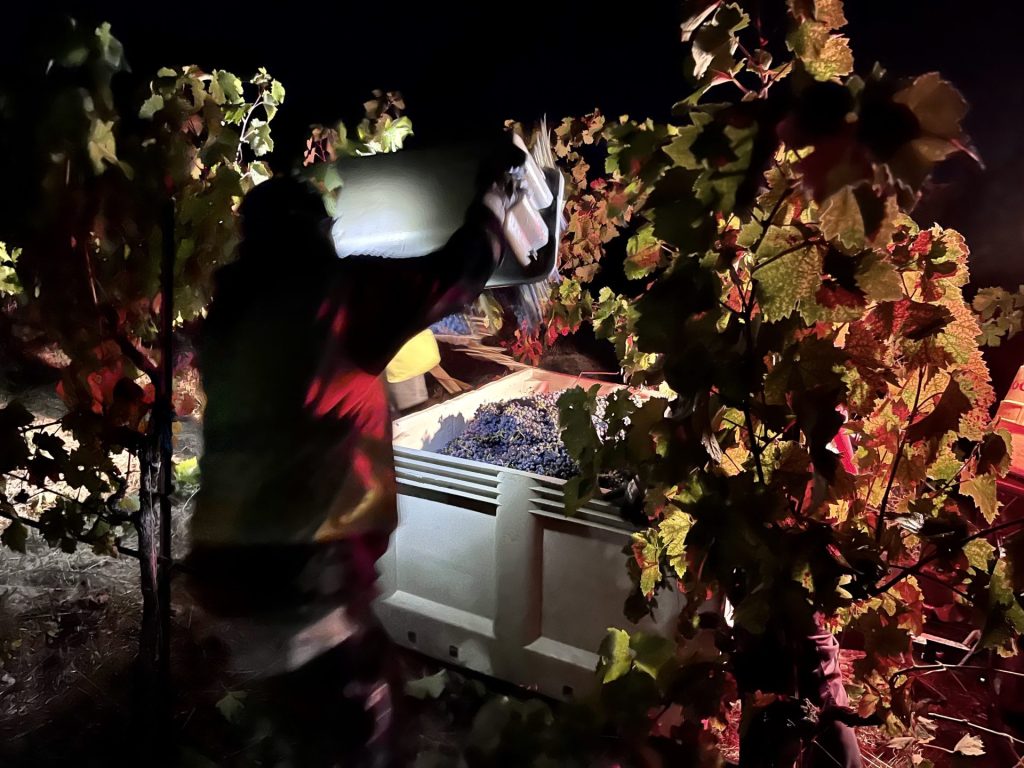
But it’s still dark inside this vine canopy as fruit fills the 1/2 ton bins of Zin
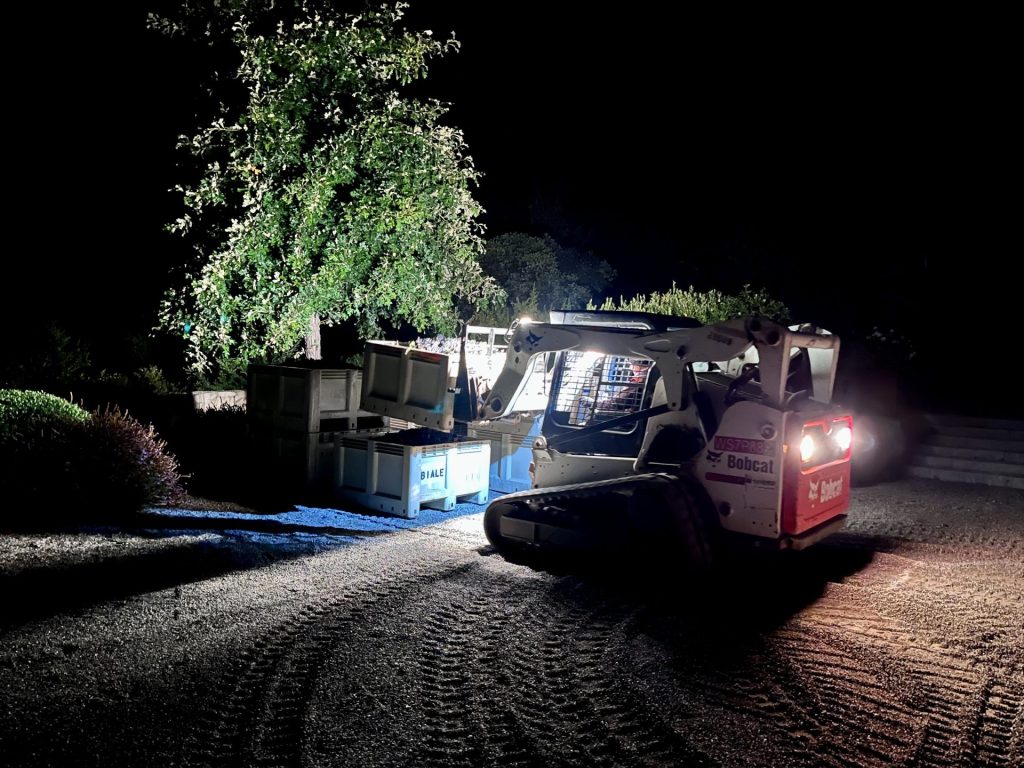
A bobcat grabs more empty bins and rushes them into the field
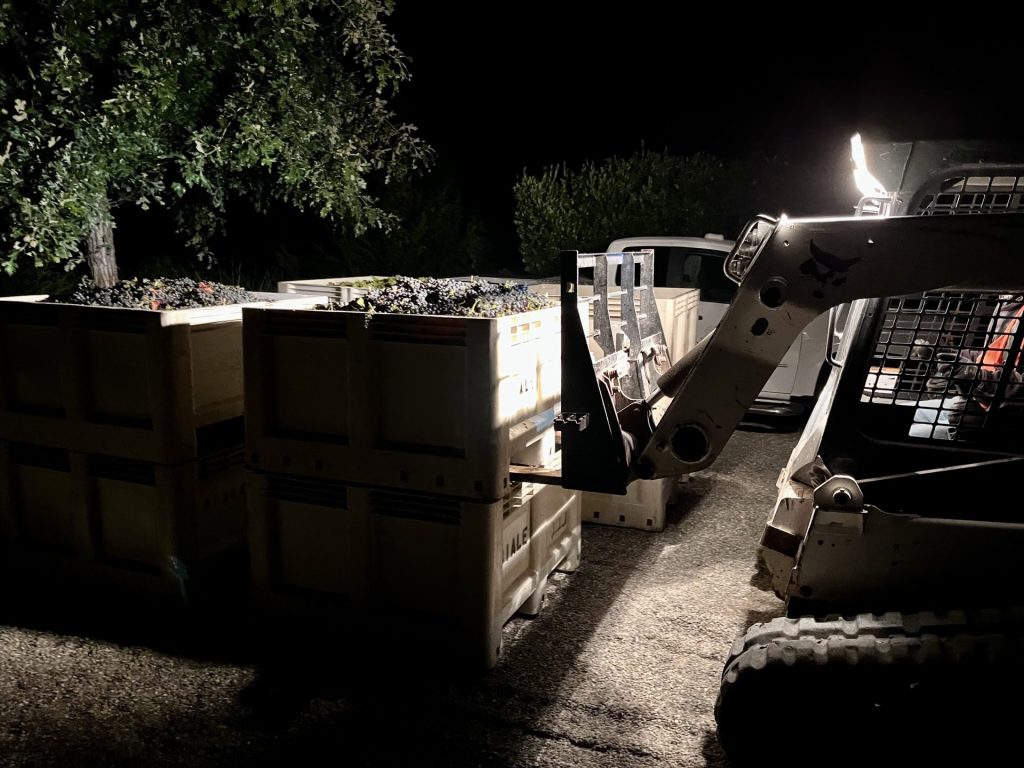
And minutes later returns with full bins of fruit. These bins are then rushed to the winery; we want that fruit to be ice-cold when it arrives.
Click here to watch a video of a night harvest
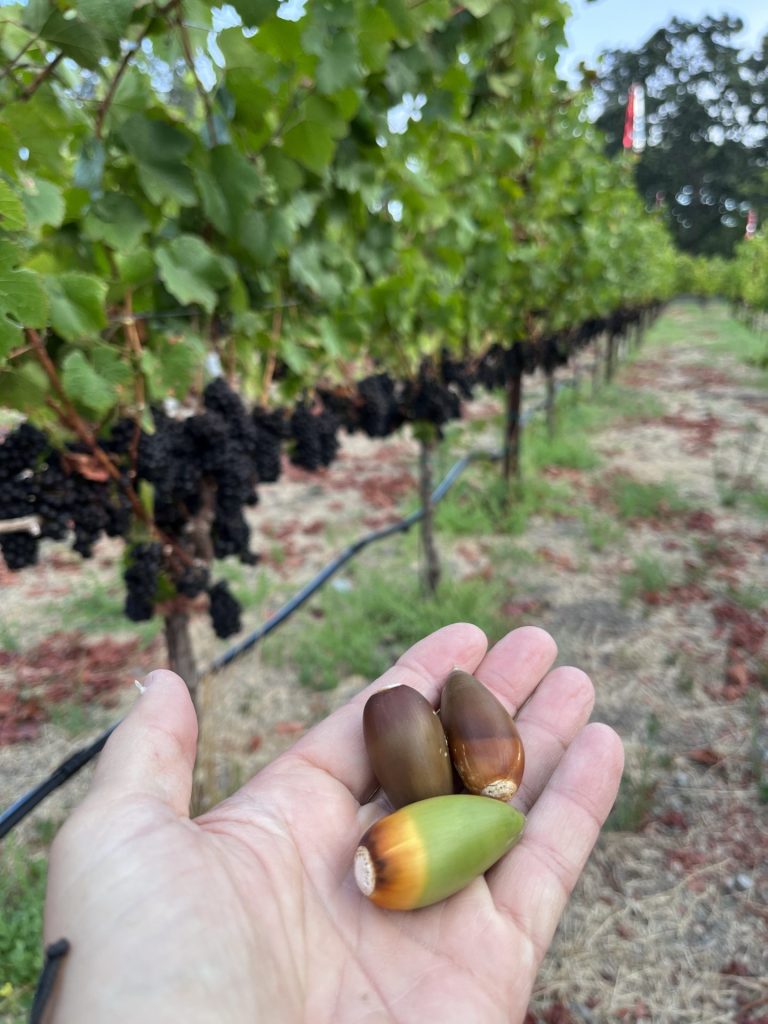
My next stop is to check out a client’s Eastside Sonoma Valley Pinot Noir vineyard scheduled to pick in the following few days. Note the dark tight-fisted bunches as is the nature of Pinot Noir.
I can never resist picking up oak acorns. Every year, I start another crop of oak seedlings from acorns, for planting around the Hydeout ranch. Some of the most impressive oak trees and their falling acorns surround vineyards in Sonoma. And those majestic beauties produce some amazing acorns that one day will themselves be majestic oak trees.
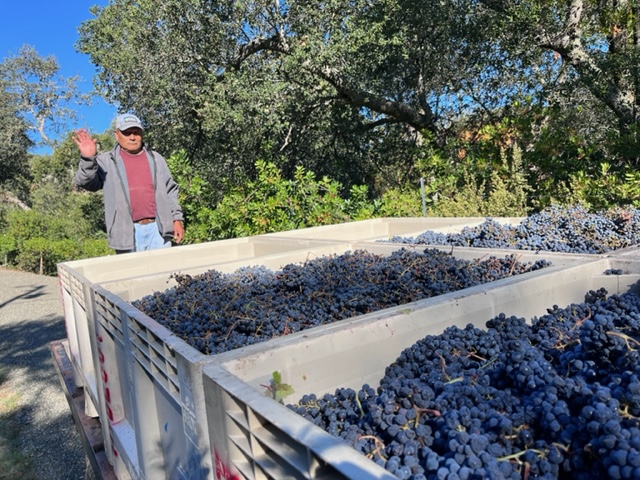
Another harvest a few days later. Ready to drive a load of Sonoma Mountain Cabernet Sauvignon to the winery.
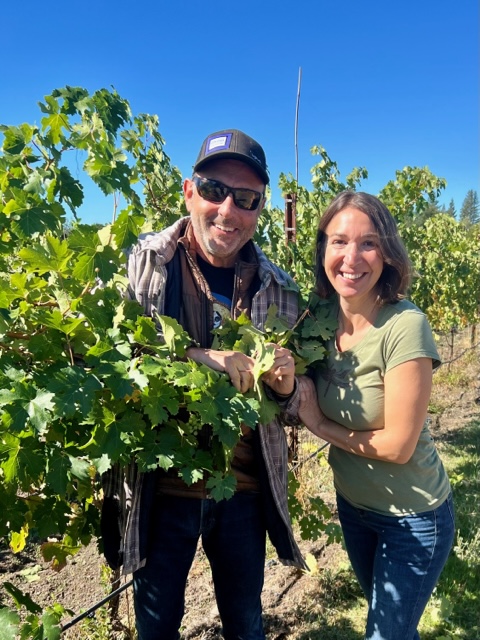
We start in the early morning hours and we look up and suddenly we realize the sun is out and it’s warm outside. Here, a moment of pause to celebrate the process of harvested grapes with Hydeout Sonoma partner and winemaker Faith Armstrong.
Processing fruit in the winery
Growing and harvesting great fruit is only half the battle. Next up is the winemaking. Every load of fruit is very carefully weighed, by law, so that each client’s property can be carefully tracked all the way into bottle; every single drop.
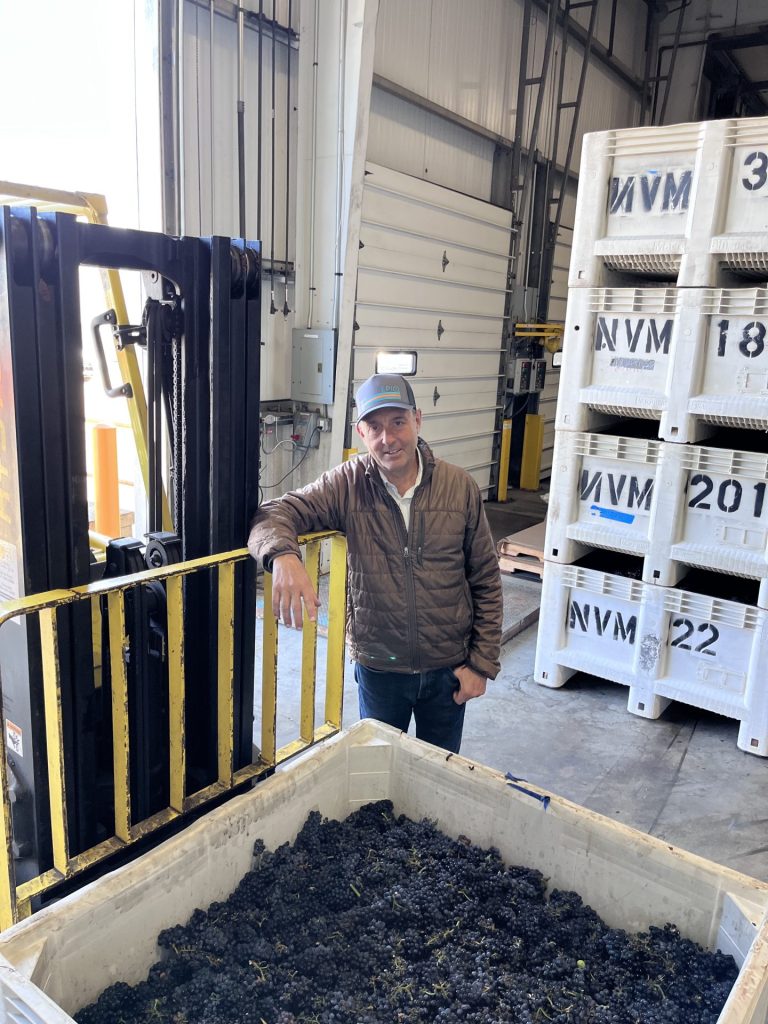
The first few bins of Pinot Noir from another early morning harvest go onto the scale
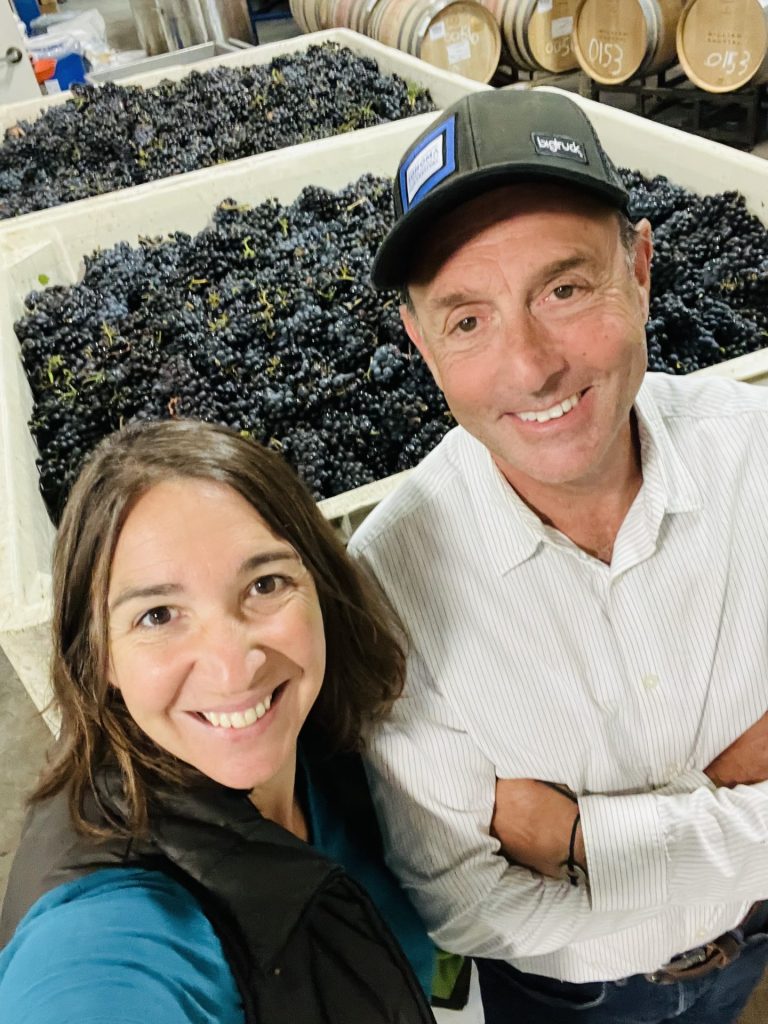
Moving into September, the long slow harvest continues to roll along as tank after tank fills with fermenting fruit. Here, happy winemakers about to get started on some pristine Zinfandel
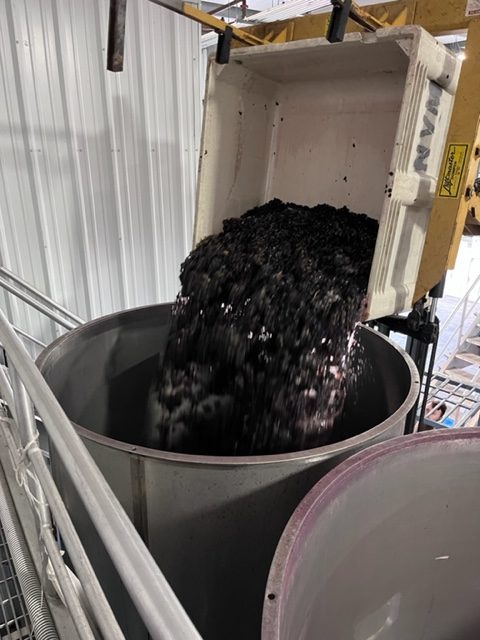
In early October, processing some Syrah from Kenwood into a 7-ton tank. The fruit from this vineyard is just across the street from Landmark Winery in Kenwood.
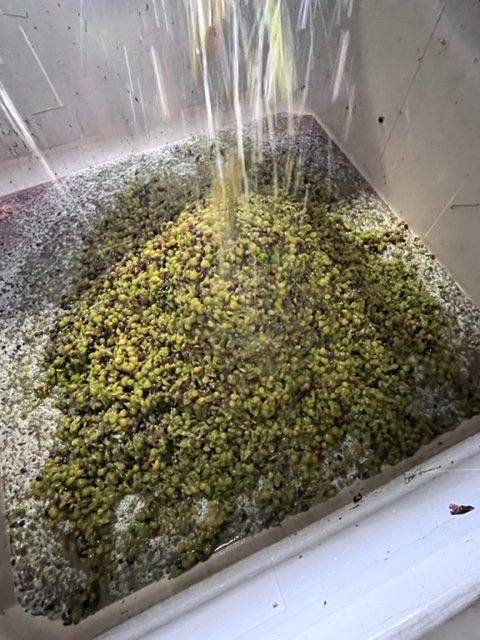
Muscat Canelli is not a very well known wine, but we love it. There are so many beautiful and under-appreciated grape varieties across the globe. This Muscat, from the Carneros Appellation in the Hyde-Burndale neighborhood, is packed full of tropical fruit and incredible peach aromatics.
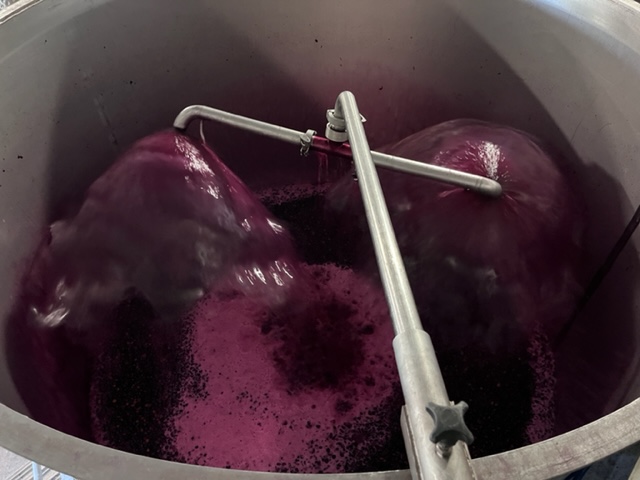
Irrigating a tank a of Grenache, a process where the fermenting juice is pumped from the bottom of the tank and “irrigated” (and oxygenated) over the top of the “cap” (the fruit floating to the top and pushed there by the expanding CO2 gas), thus encouraging the yeast to thrive and to keep the cap wet (because if it dries out, bad things can happen like the formation of vinegar).
Click here to watch a quick video of “irrigating” the cap
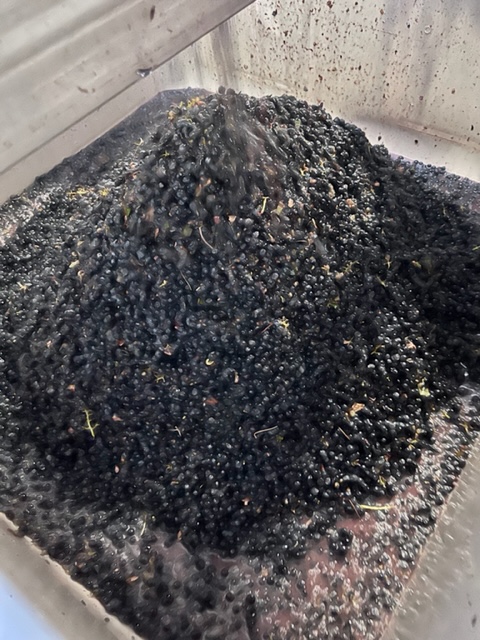
Now mid-October, and we’re still at it. Here, clean de-stemmed fruit accumulating in a bin, headed to a fermentation tank in a moment
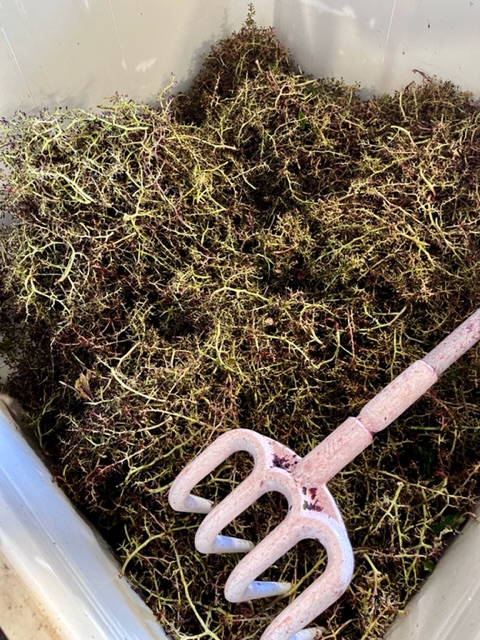
The stems accumulate after the fruit has been removed for winemaking
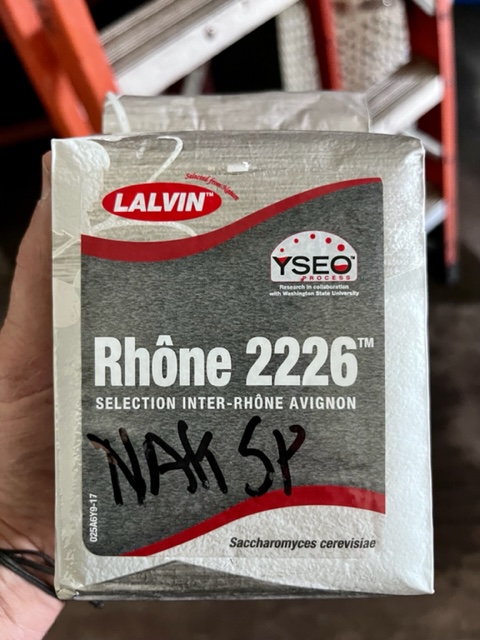
After the fruit is moved to a fermentation tank, and lab reports have been studied, we re-confirm our goals for the wine. Carefully selected yeast is added to get the fermentation rolling. In this case, a yeast from the Rhone region is specially selected for Syrah and Grenache which are Rhone varieties.

The yeast is very carefully rehydrated, and then slowly small amounts of cool raw grape juice is added and the yeast cells adjust to the temperature and awaken.

Lots of oak barrels must be prepped because soon enough, all these tanks of wine will complete fermentation and, one by one, those wines must be quickly moved into barrels where the long aging cycle begins. (footnote: T-shirt was a gift from Chewy, my Desert Caballero ace cowboy buddy)
Pizza party at the Winery, at about the halfway point, 6 weeks in and about 6 weeks to go…
Exhausted but happy, a moment of pause for some local Mary’s Pizza with the awesome winery team. Pacifico (yellow cans) was the beer of choice for all on this day – except of course for one of the guys who always wisely choses a Coors Light…see the empty seat…yup…I made the right choice!
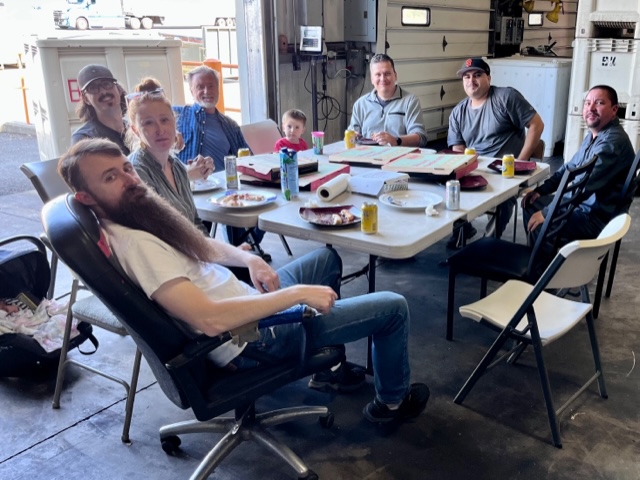
The team at Arcana Custom Crush Winery on 8th street east in Sonoma, the management and cellar crew, from left to right: Sebastian, Kate, Mat, Bill, Landon (Maverick), Miguel, Jose, Jesus
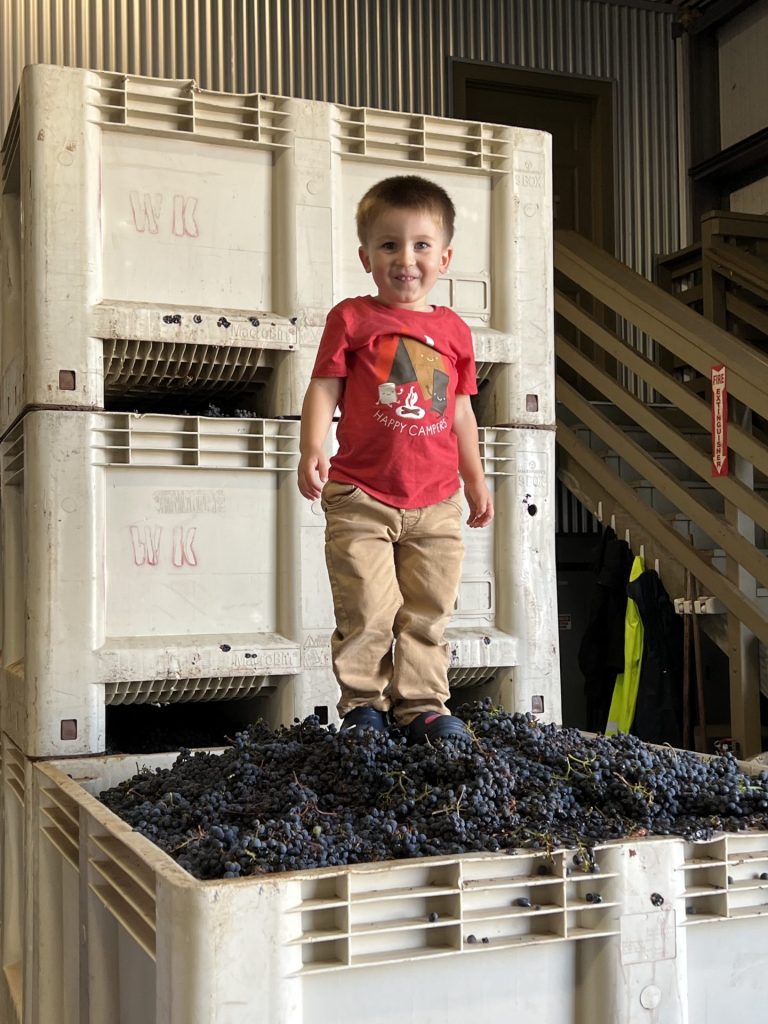
Our winery mascot, Kate’s son Landon, welcomes another load of fruit by crushing it with his own feet. I like to call him “Maverick” because he looks like Tom Cruise from Top Gun, and moves around the winery at the same speed. If you’re a mom and it’s harvest time, the kids go to the “office” too and become part of the action.
Mid-October, yet another harvest, and this time breakfast is included!
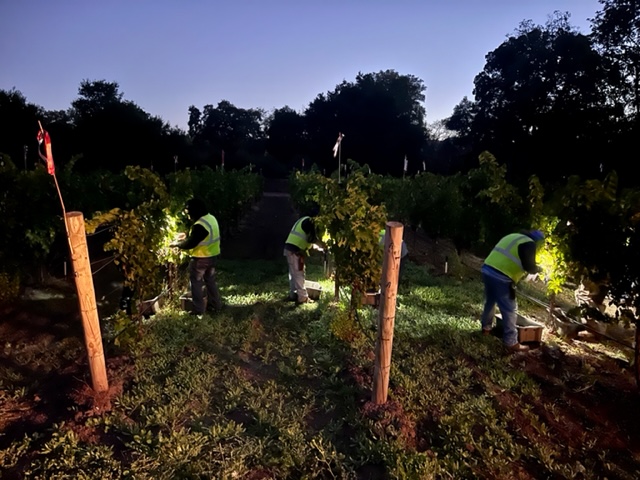
Starting in on a some short rows as the sun rises
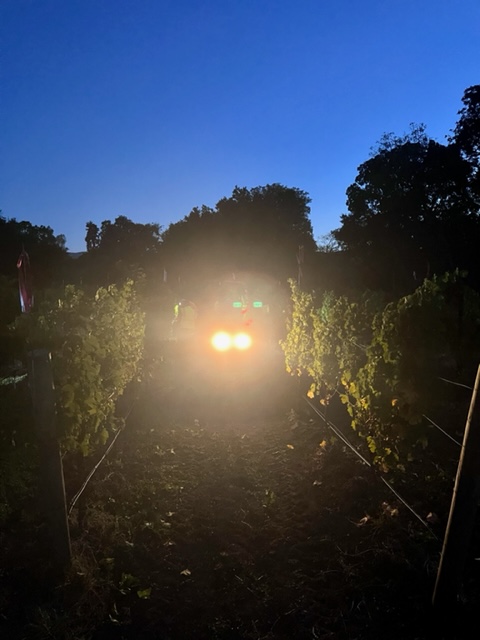
The tractor leads the way pulling bins quickly filling with fruit
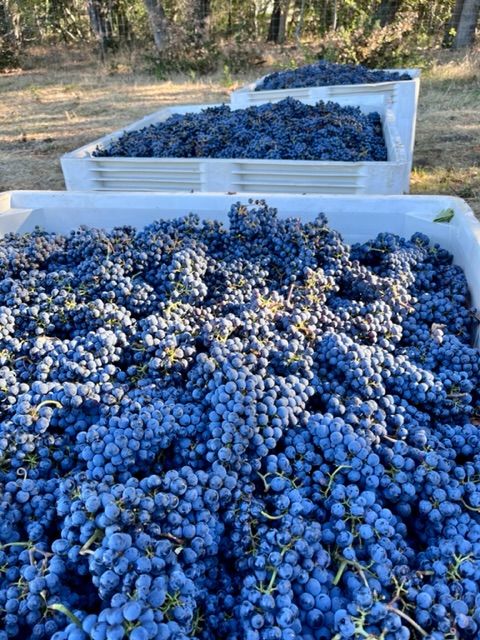
This is what really pristine Sonoma Valley cabernet sauvignon looks like
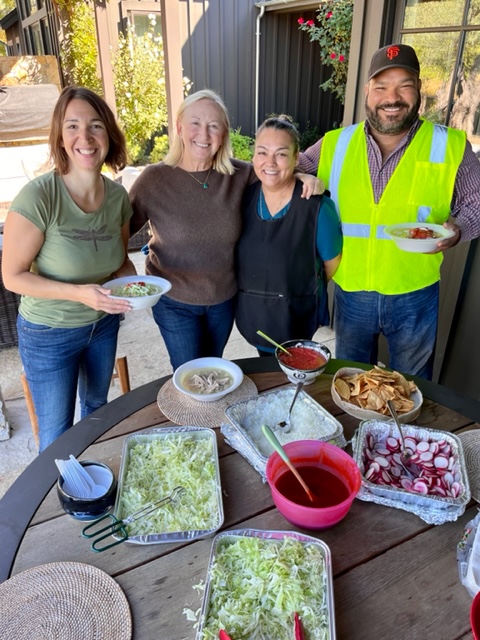
After this harvest, our wonderful client offers everyone a delicious meal. Last year was tacos and tostadas, this year was an amazing Pozole soup made of pork and hominy (the word “pozole” is thought to come from Nahuatl, the Uto-Aztecan language spoken in various forms during pre-Hispanic times).
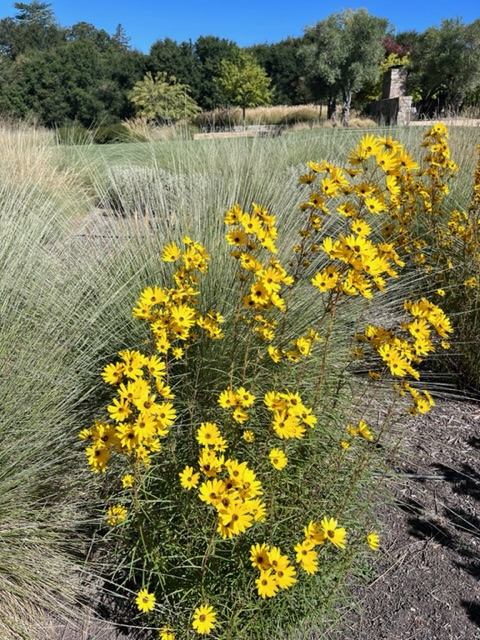
Vibrant “thin-leafed sunflower”, always blooming around Sonoma at harvest time
Jack London State Historic Park – and the Park Partners – there is always time in Sonoma for another gala non-profit fundraiser!
Jack London Park Partners emerged during a budgetary crisis in 2012 which shuttered many state parks. It was the first non-profit organization to take up management of a state park on behalf of the people of California and it has been successfully running Jack London State Historic Park ever since. If you haven’t been, please do schedule a visit. It’s very scenic and historic too.
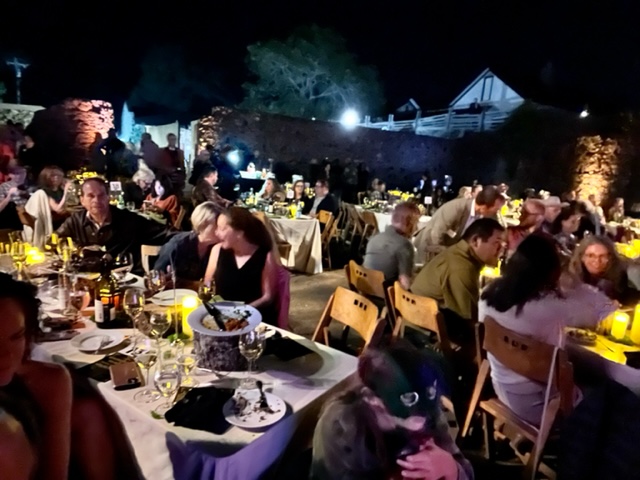
Park Partners hosted a sold-out entertaining outdoor gala event on Sept 24th.

The staged event theme, as seen here, was “Once upon a time in a not so distant forest lived an ancient redwood tree who silently presided over her forested sanctuary.” Adults and kids, dressed up as tree and forest creatures, was totally entertaining. A real hoot!
Final Harvest of 2022 – the last fruit to ripen and the final harvest of the year – our very own Sonocaia estate Sagrantino from here at the Hydeout Ranch
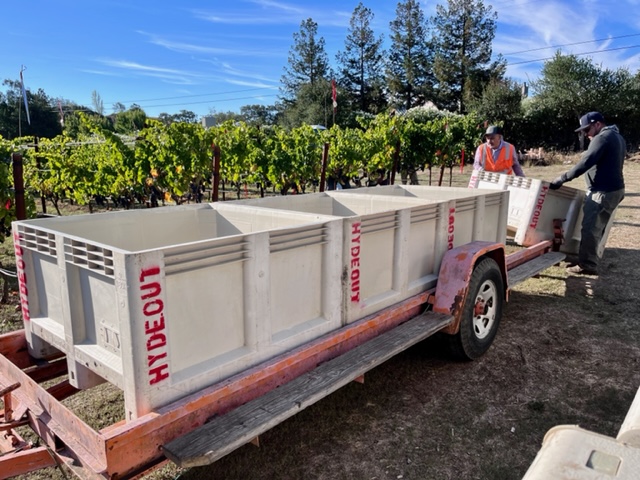
These Hydeout half-ton bins are cleaned, loaded on the skid trailer, and waiting to be filled.
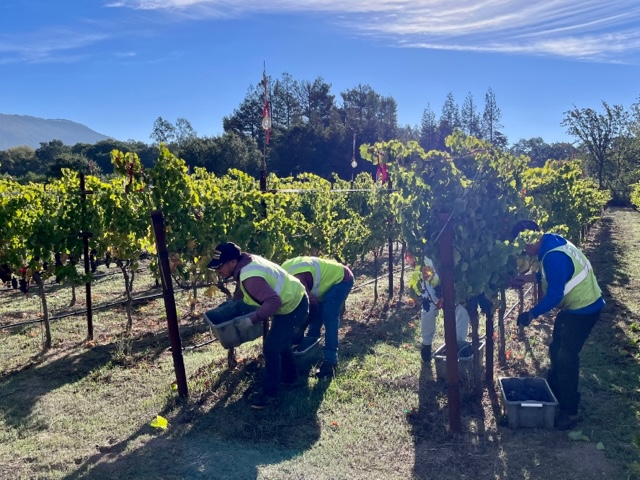
It was a very cool damp night so we waited until the sun was up and dew was off the fruit before picking, but still it was just 40F outside.

The first of several bins begins to fill, and the fruit will be on its way to the winery in moments.
Vintage 2022, you started off so perfectly, with a terrific mid-winter atmospheric river and a lovely mild spring and summer, but then you turned on us and cooked us to a crisp for five days at +110F, and then you rained more than inch on us, and then it turned cold. Just another hah hah season in wine country.
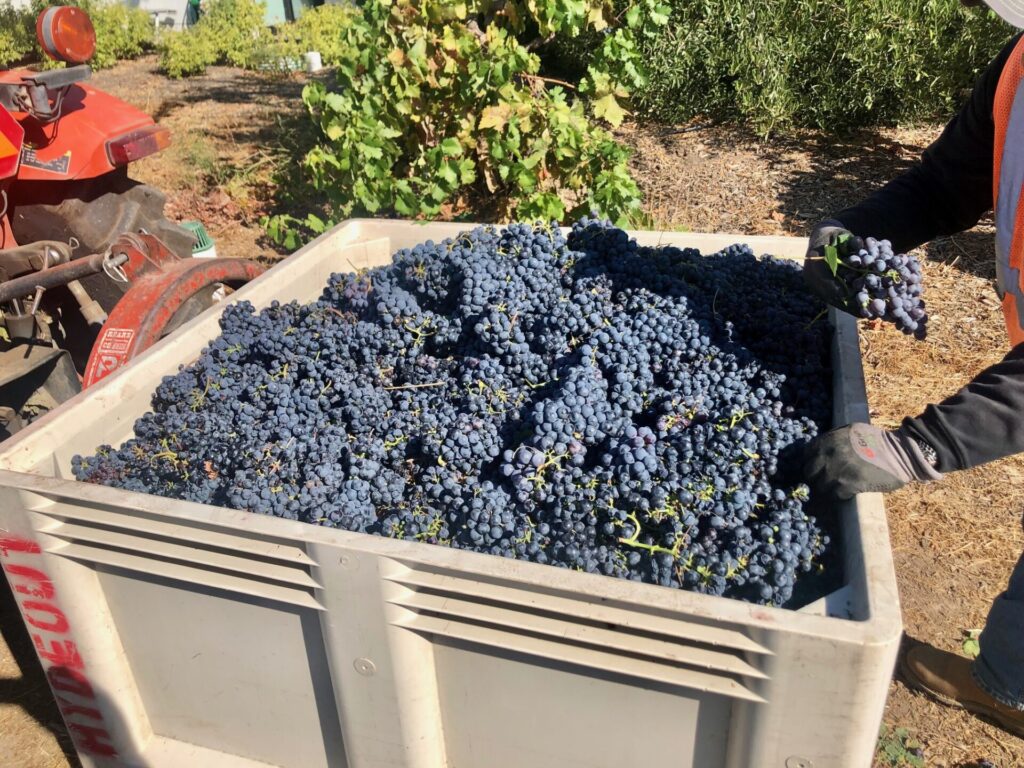
The final lug of 2022 grapes, our inky tight-bunch Sagrantino…ahhh! We’ll start pruning all the vines in February and the process repeats yet again.
If you are still reading?…
Late into October 2022, and the first of our client’s harvested grapes (from late August harvests) have completed fermentation. We’ve pressed the wines off, settled in tank, and now it’s time to barrel them down and put these wines to bed for the winter:
A final acknowledgement – Nunez Vineyard Management:
I first met Mike Nunez and his family, of Nunez Vineyard Management, going all the way back to when we opened La Honda Winery in Redwood City more than 20 years ago. A client of Mike’s who owned a vineyard in Sonoma sent his fruit down to us to process. That year, the fruit was harvested late and we ended up making a beautiful port wine. Mike drove the fruit down himself. I met him at our loading dock. We’ve been friends and colleagues ever since.
The Nunez family has deep roots in both Sonoma and Napa. We partner with them on many client projects, and our combined knowledge and experience creates a great outcome for everyone.
And, everyone involved in the growing of grapes and making of wine is publicly acknowledged at this Nunez Vineyard Management harvest party. A class act!
Next year, I think it will be fun to post a blog looking back over my 23 vintages. For now, here is a sneak peek looking back to the year 2000, and the founding of La Honda Winery, in Redwood City:
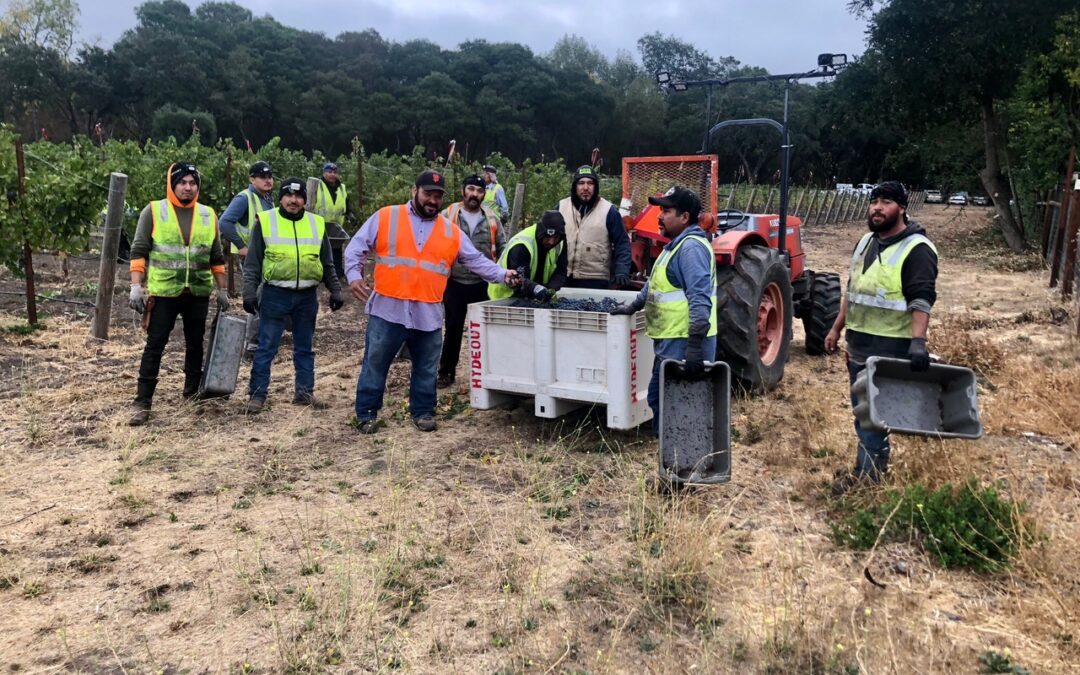
Oct 16, 2021 | 2021 harvest, Dysfunctional Family Winery, Hydeout Sonoma, mustard blooming, Sonoma, Sonoma Farming, Sonoma lifestyle, Sonoma Valley
For Hydeout Sonoma and Dysfunctional Family Winery, it’s another wine harvest in the books. Vintage number twenty-three for me.
Here is a quick pictorial essay of the entire 2021 season.
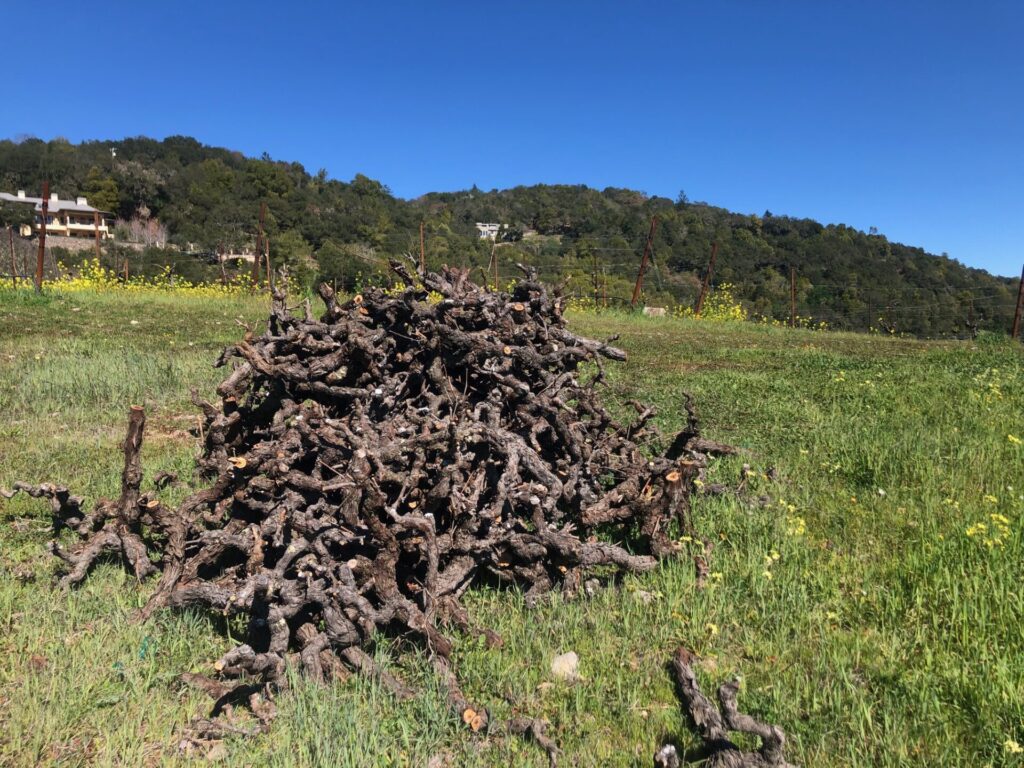
On a bright blue day in February, pruning of the dormant vines is the first order of business (here we severely pruned an old vine Zinfandel block and piled up these cuttings for a local artist’s wood project)
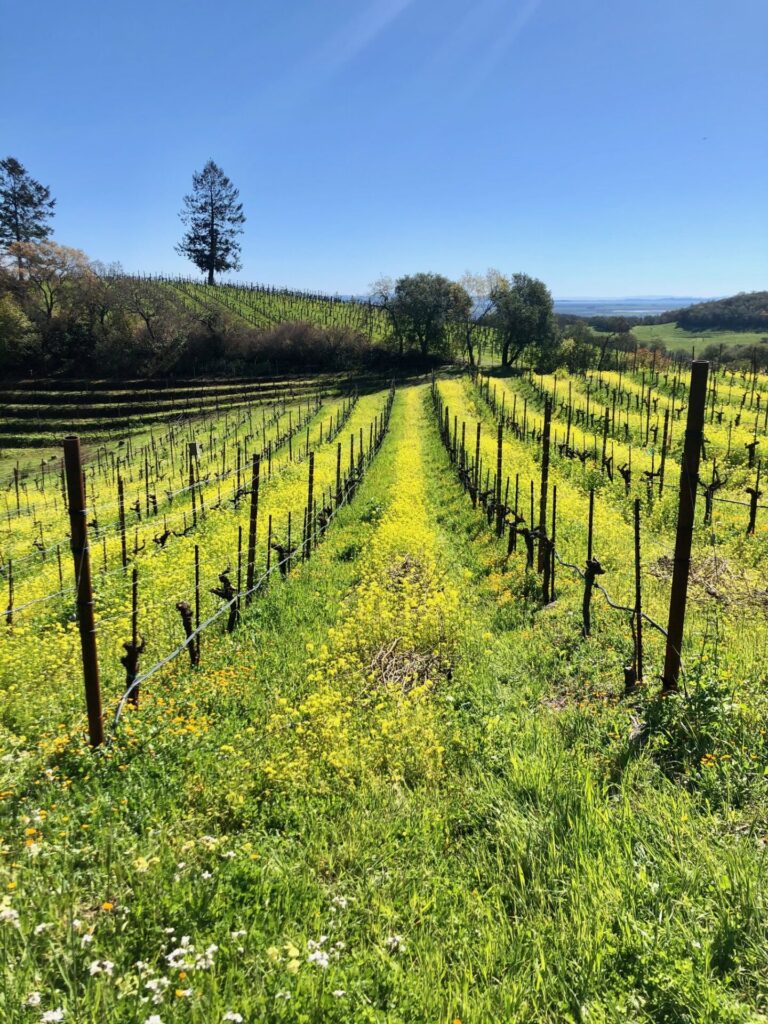
The vines after pruning, a bit of rain falls, and the mustard cover crop starts to push
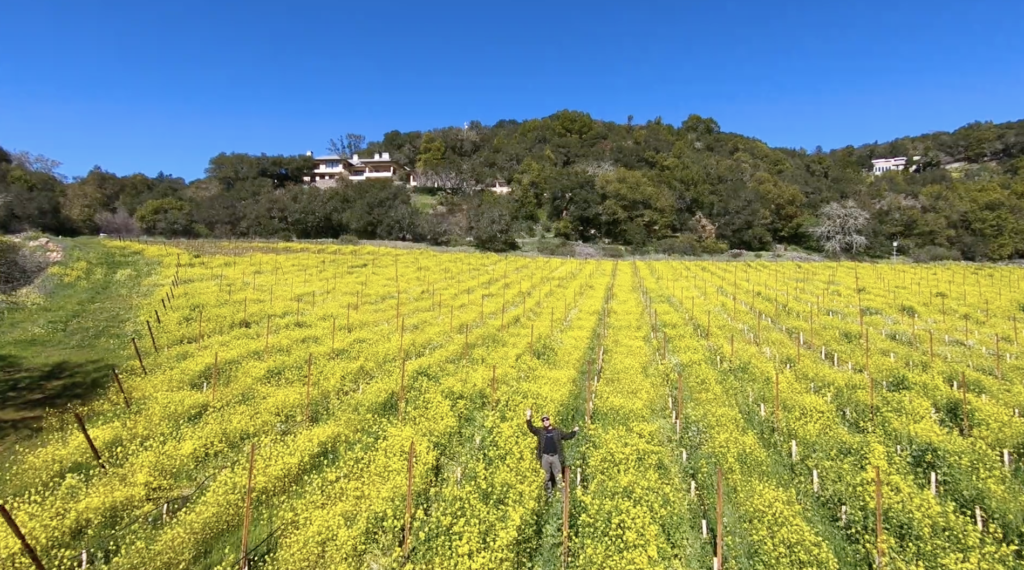
Soon the mustard is towering over the vines (here I am in a drone-shot in a newly planted Cabernet block)
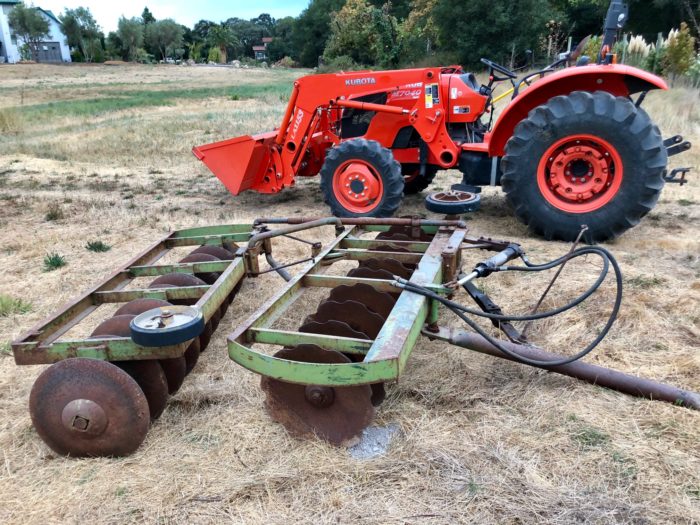
It will be time soon to begin actively farming for the season, and so we start prepping the equipment for the next few months of heavy use.
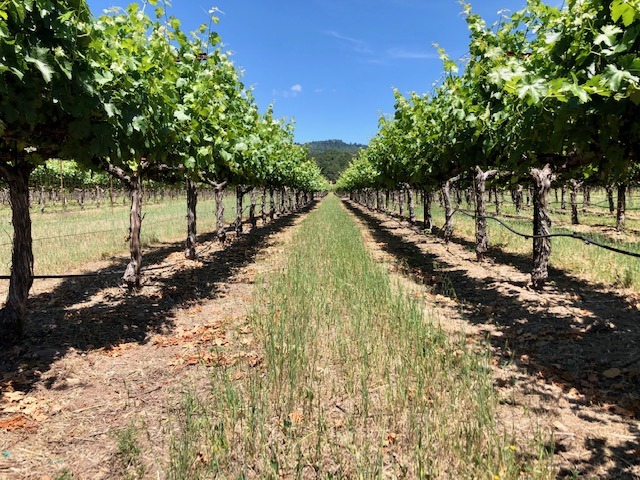
But grapevines are hardy and soon the vine shoots are elongated, and deep inside the canopy the fruit begins to flower and set.
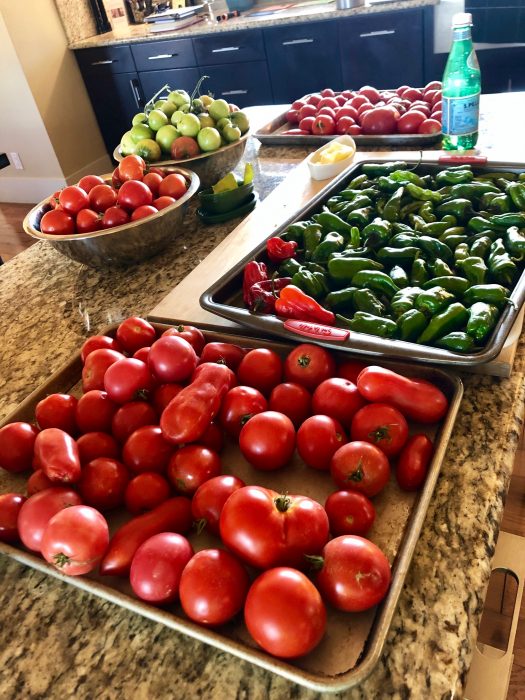
And our garden at the Hydeout responds to the summer heat with a bountiful harvest
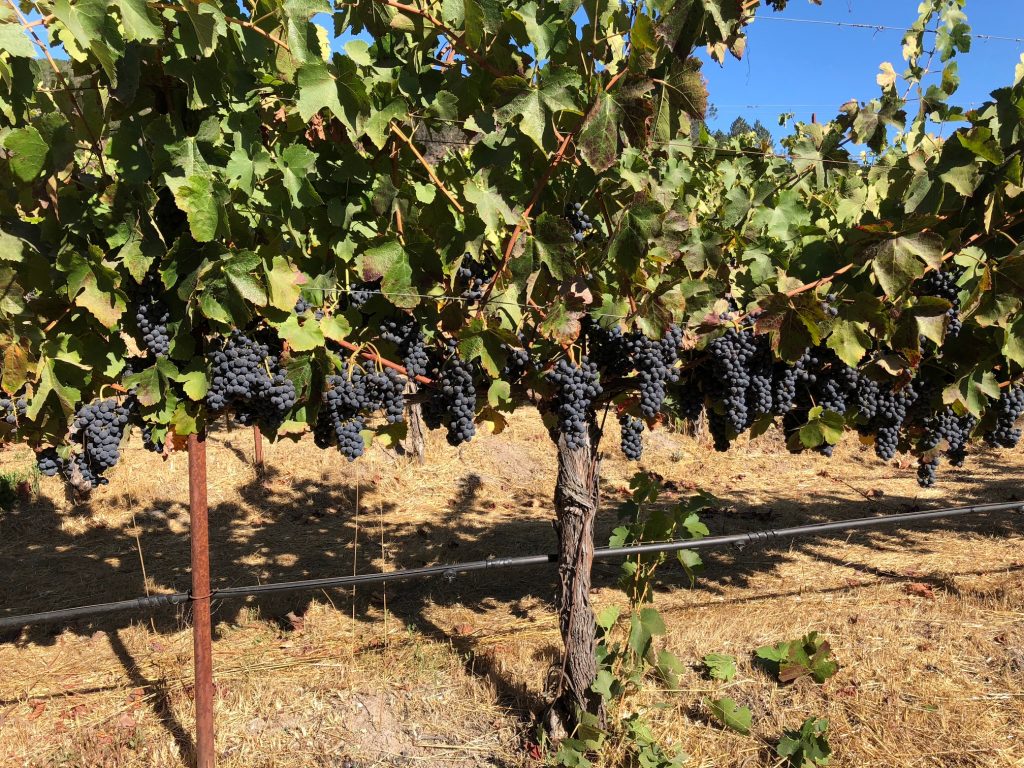
And the next thing you know, like magic, tons of fruit is ripening quickly.
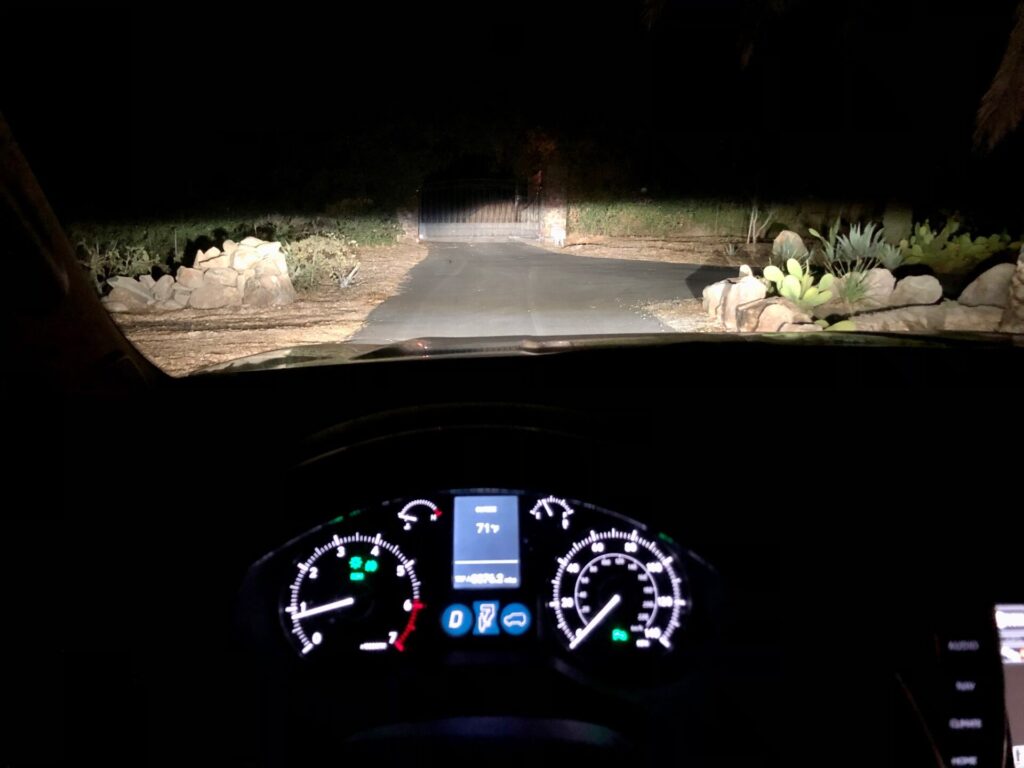
The first morning of harvest, and I am headed out at 4:00am, the car still a comfy 71F from being in the garage, but it’s a chilly 48F outside.
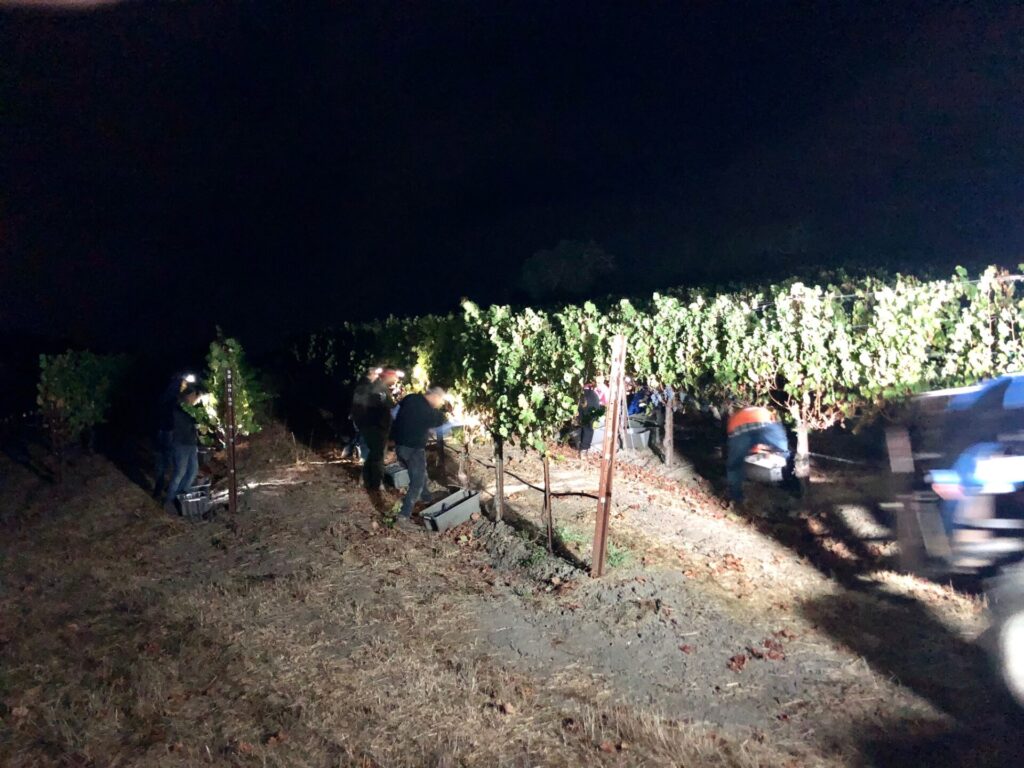
I arrive to find the crew well underway with harvest, as the first few vines get picked.
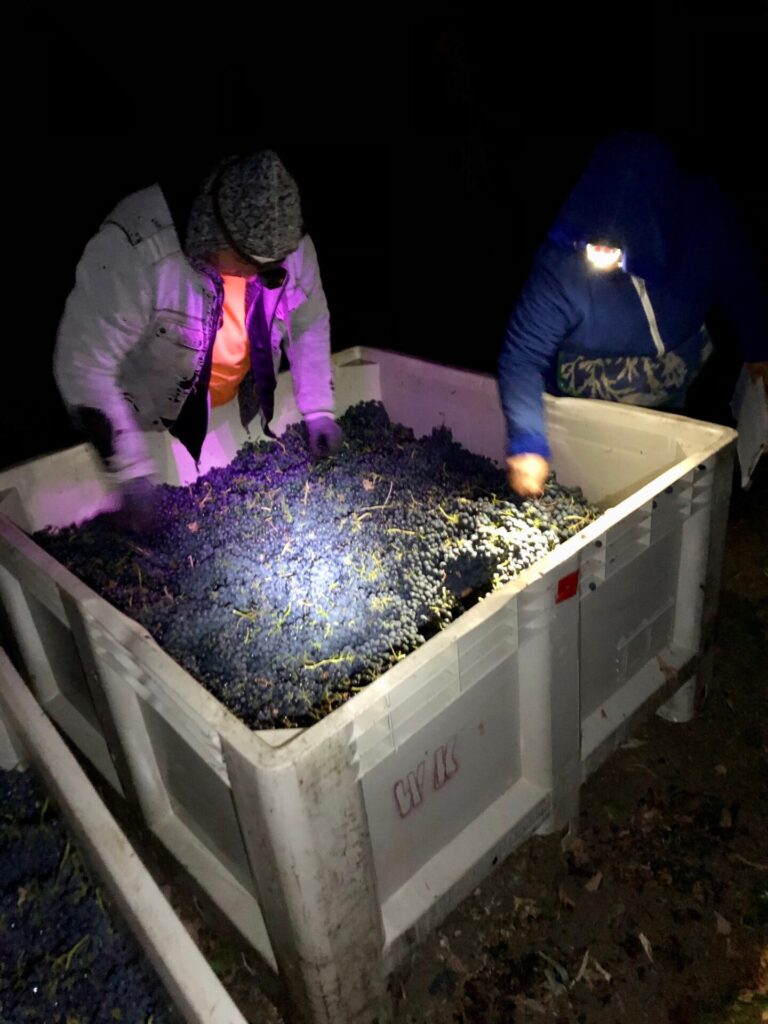
And after a long season of work, the half-ton bins begin to fill with ripe dark inky fruit
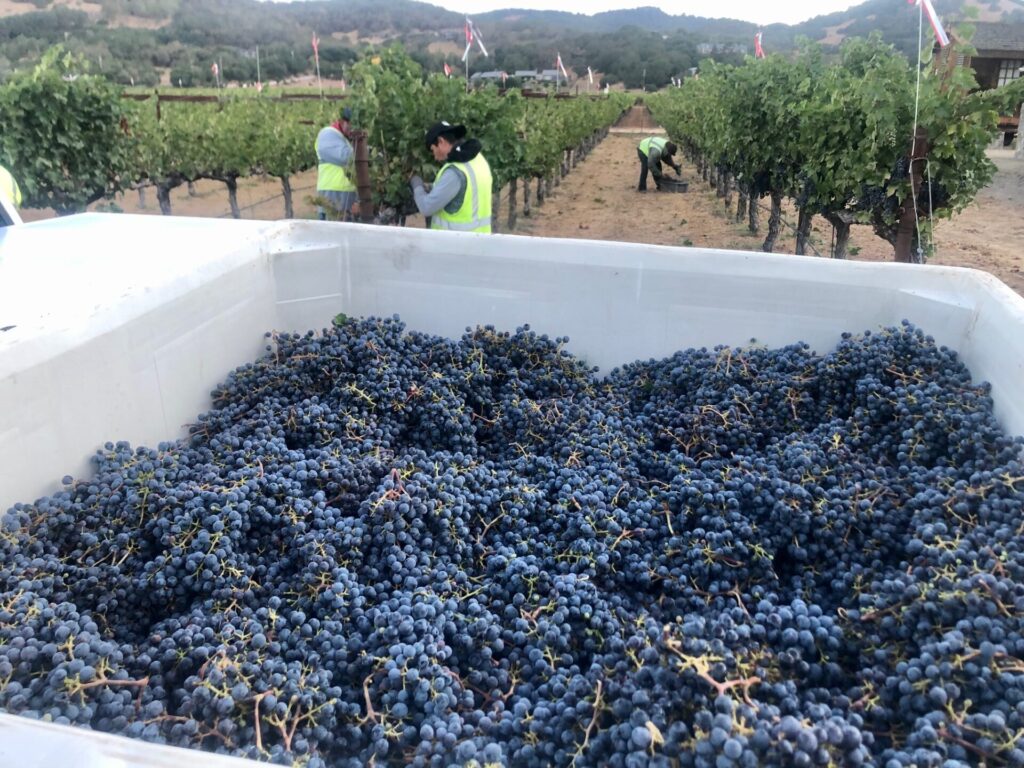
The sun rises and last few rows of this block get harvested.

And soon many tons of perfectly ripe fruit are ready for delivery to the winery
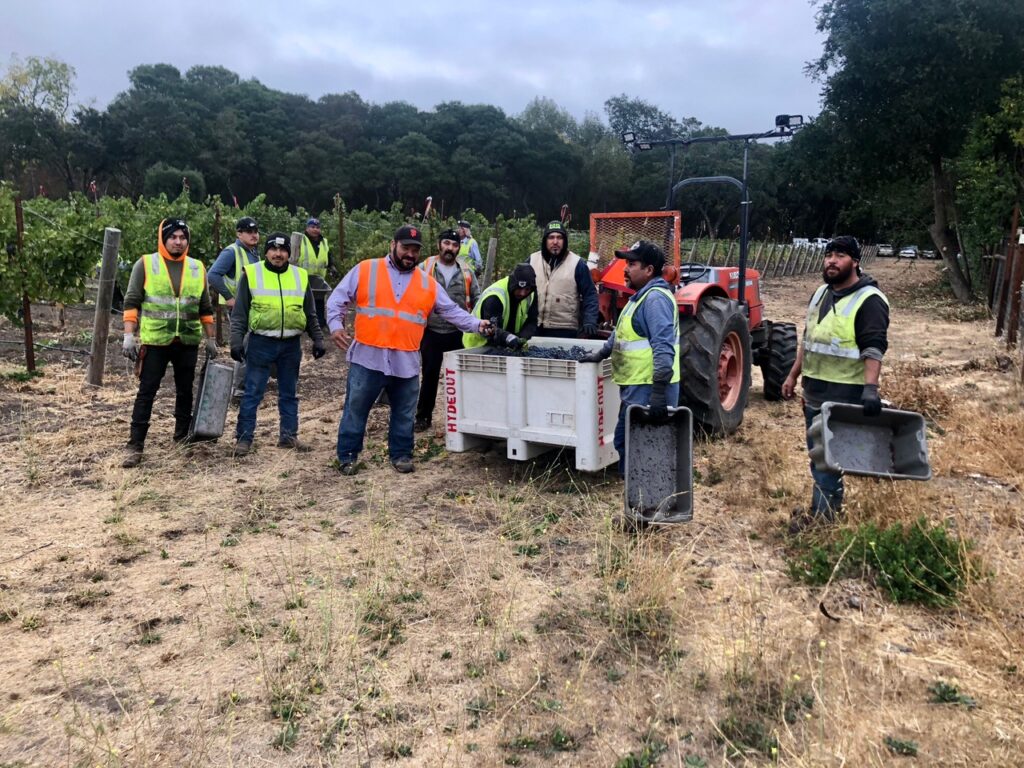
And eight long weeks later, the last bin of fruit is picked and is headed for the flatbed truck, and the team takes a big sigh of relief.

And now the work moves to the winery, here tank #20 is cleaned and prepped for some ripe Syrah from Kenwood
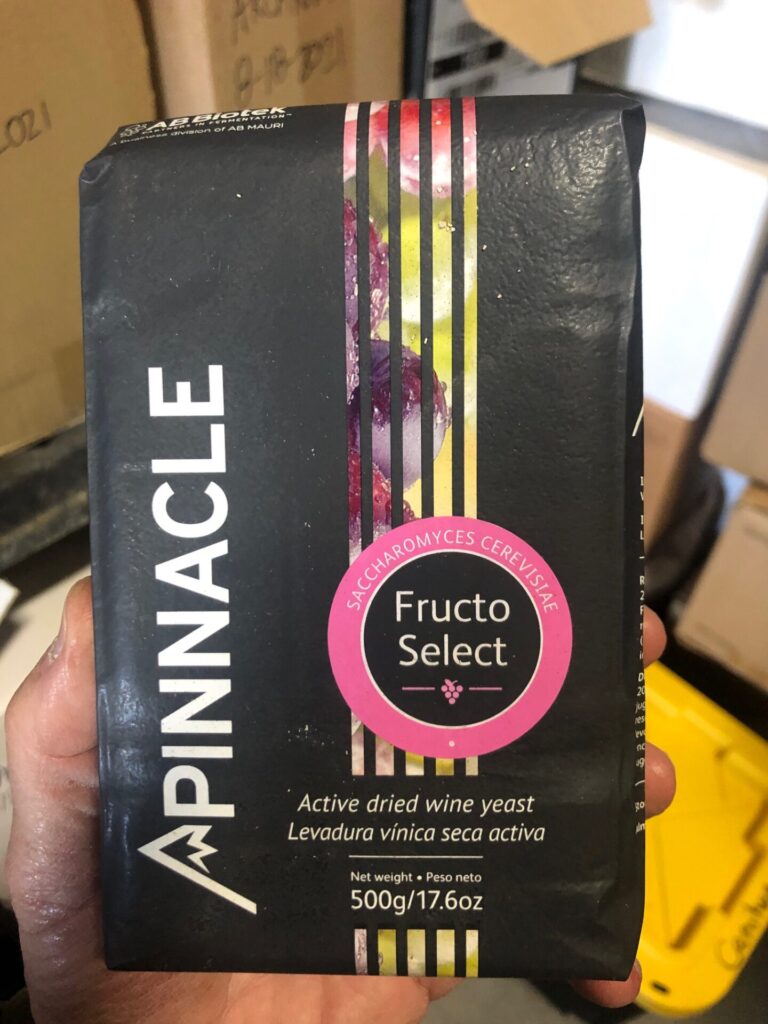
The yeast selection for this cuveé has been made, and this particular selection is a powerful one that will reliably finish fermentation in high-alcohol super-ripe red wines
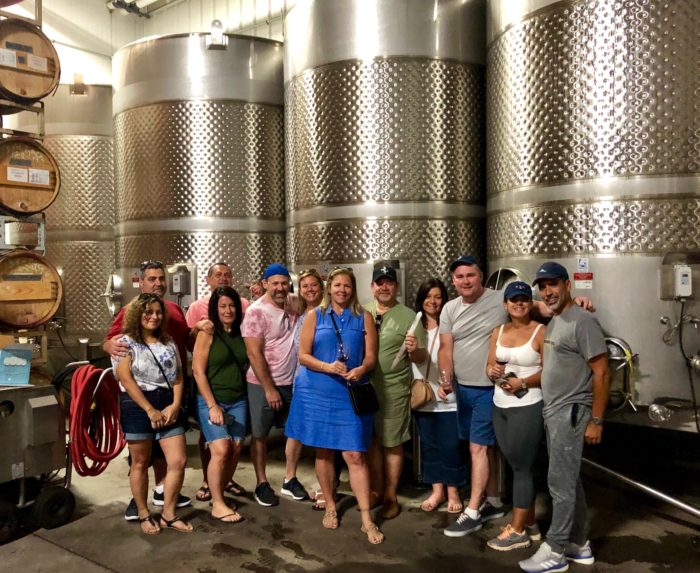
Excited clients, family, and friends stop by the winery to celebrate a year’s worth of effort safely in tank
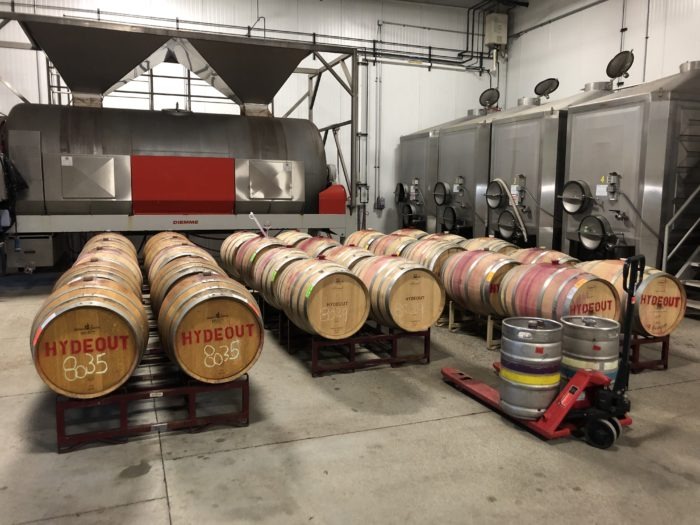
And once fermentation is complete a few weeks later, the wines are “barreled down” and the season is put to bed!
Click on these live-action videos to get the real feel of the moment:
Picking fruit by hand on a steep hillside
Filling a half-ton bin from the forty pound lug boxes
At the winery, raw fruit from the field is processed in the destemmer
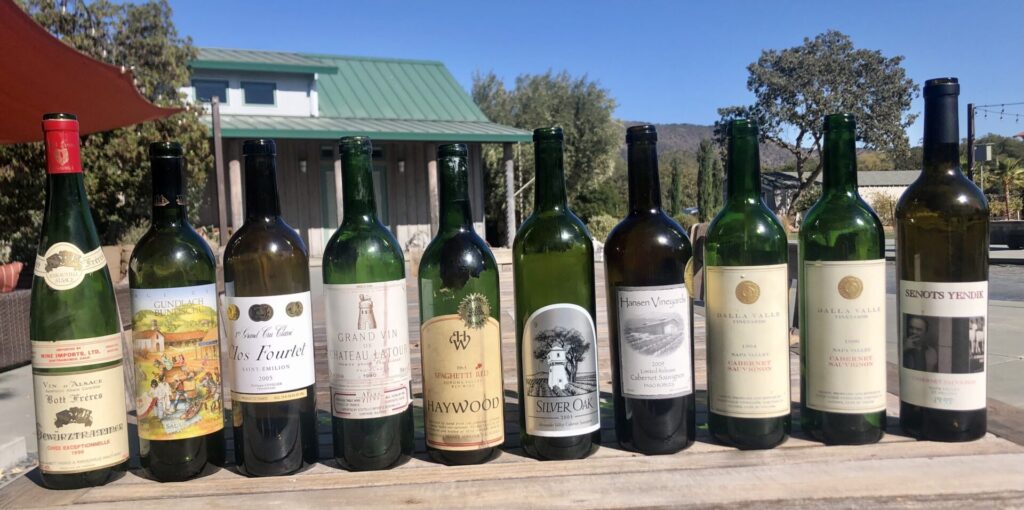
After the harvest, some wine-loving friends gather to share ten special old bottles from our cellars:
- Botte Frères Vin D’Alsace Gerwertztraminer, 1990, Cuvee Exceptional
- Gundlach Bundshu, Sonoma Valley, 1990, Cabernet Sauvignon
- Clos Fourtet, 1st Grand Cru Classé, Saint Emilion, 2005
- Grand Vin De La Chateau Latour, Paula, 1990
- Haywood, Spaghetti Red, Sonoma Valley, 1983
- Silver Oak, Alexander Valley, 2003, Cabernet Sauvignon
- Hansen, Limited Release, Paso Robles, 2009, Cabernet Sauvignon
- Dalla Valle Vineyards, Napa Valley, 1994 Cabernet Sauvignon
- Dalla Valle Vineyards, Napa Valley, 1996 Cabernet Sauvignon
- Senots Yendick, Napa Valley, 1999, Cabernet Sauvignon
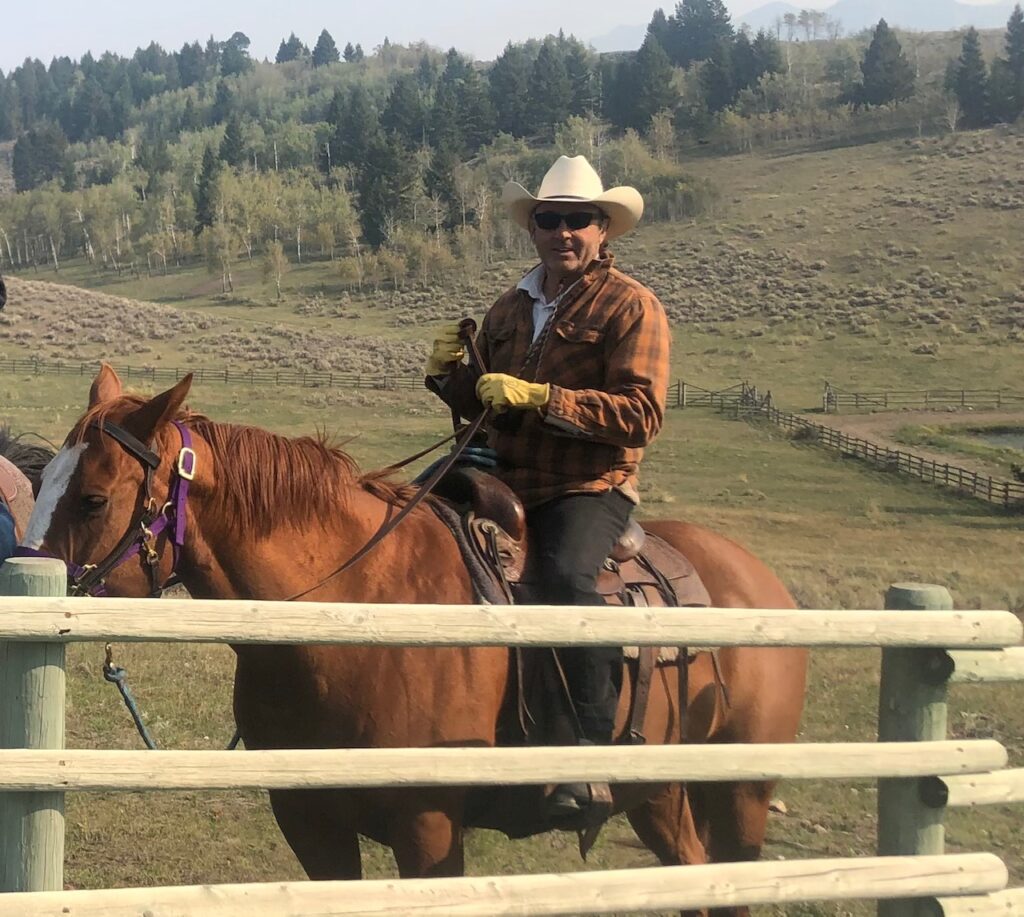
And there’s just enough time before winter arrives for this winemaker to head off to Ennis, Montana for some fresh air
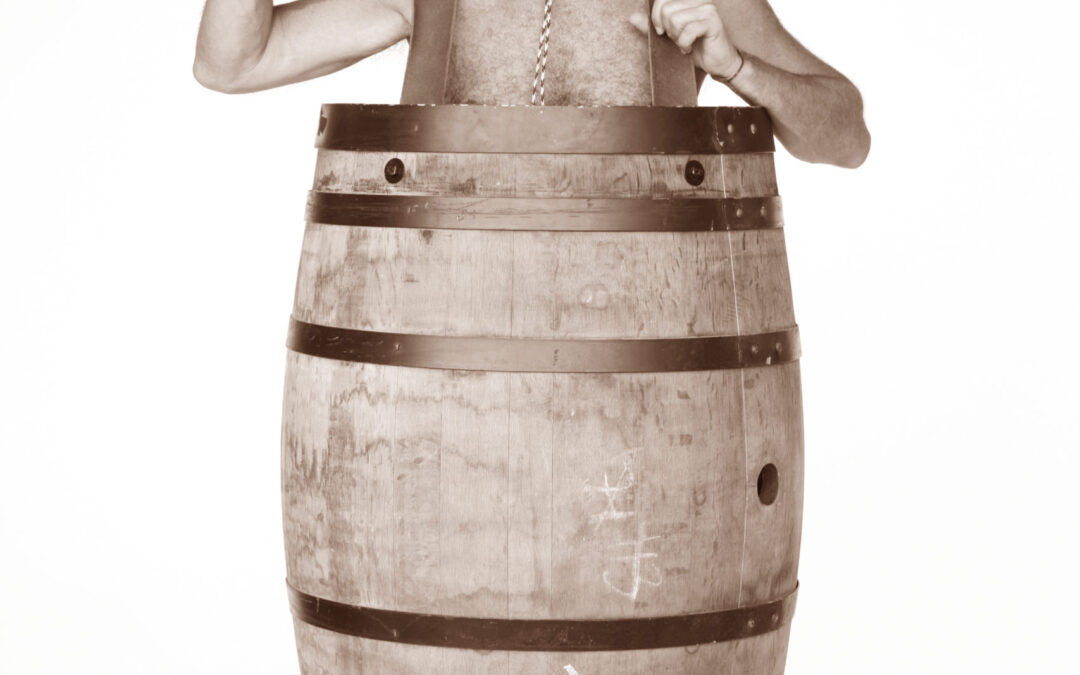
Aug 21, 2020 | Sonoma, Sonoma Farming, Wine
What would wine be without a label? (We do have a word for naked wine bottles…they’re called “shiners.”) Join me on a quick road trip as I travel to our wine label printer’s factory, MPI Label in Stockton Ca. After the wine team completes the brand identity, trademark, label design, and the required label approval from the federal government, the final artwork is sent to the label printer’s pre-press team. Then it’s time for the wine label press check:

Long before the wine label press check, the decision of which paper to use is critical – every option from bright white felt to creamy eggshell is available to the wine label designers.
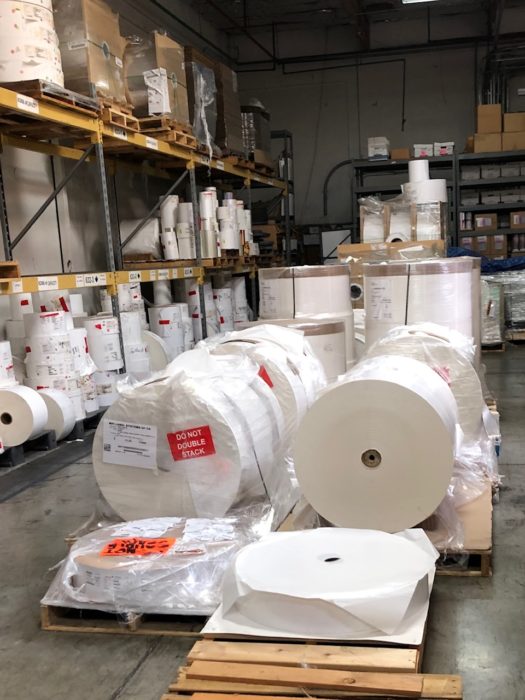
Those are huge! After the paper type is selected, the process starts with palleted spools of 1-ton raw paper sitting on the press factory floor.
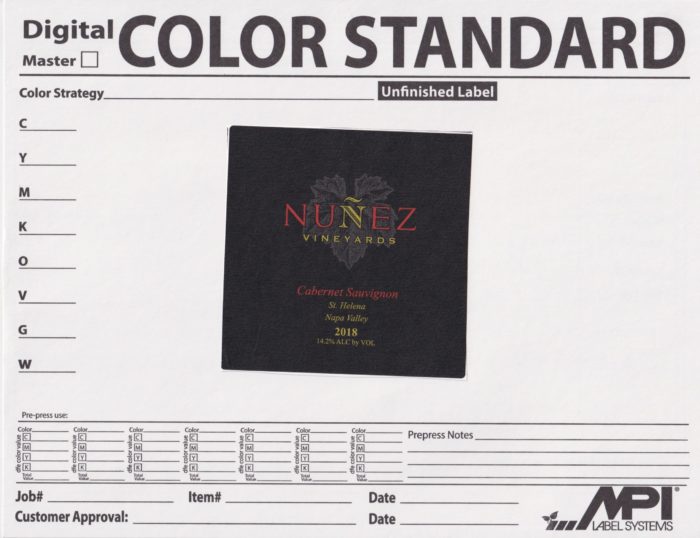
The press team will run a sample of our client’s label for the client’s rep (me) to approve, thus the term press check. Here, our client’s artwork, the Nunez Vineyards Napa Cabernet, is the approved ‘control’ label given to the press operator who must precisely match this artwork throughout the entire press run.
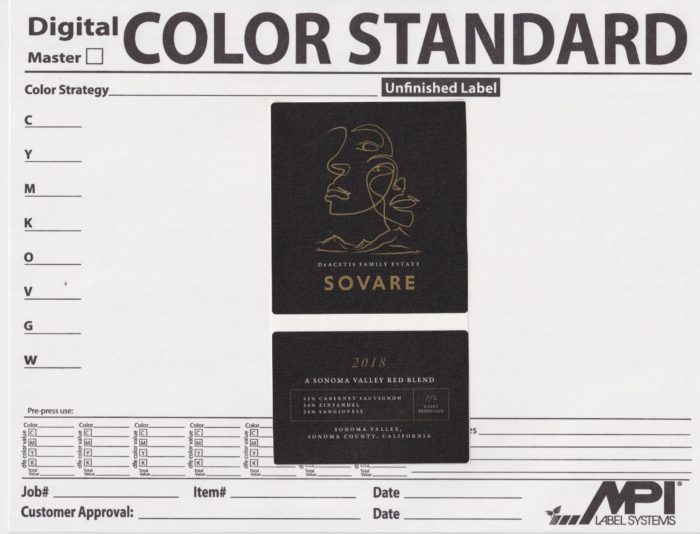
And this press check proof is for another of our clients, the DeAcetis Family “Sovare,” a field blend of Sonoma Mountain Cabernet, Sangiovese, and Zin wine.
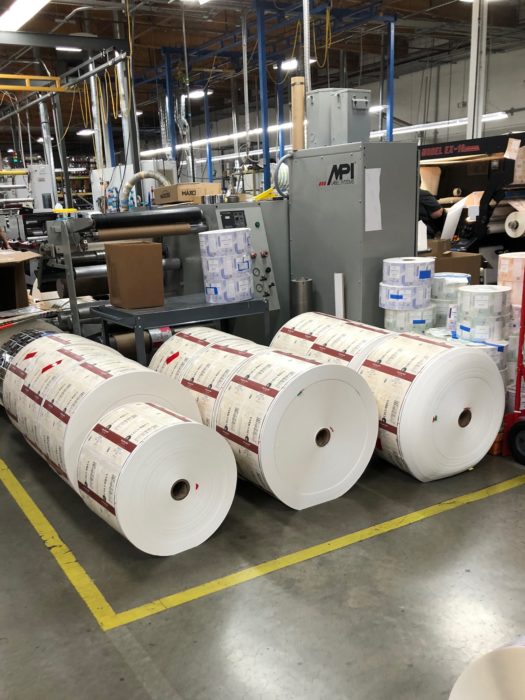
After running through the 1/4 mile long press, the label paper emerges as a continuous roll of almost-finished printed labels.
Video – watch the label printing on the press
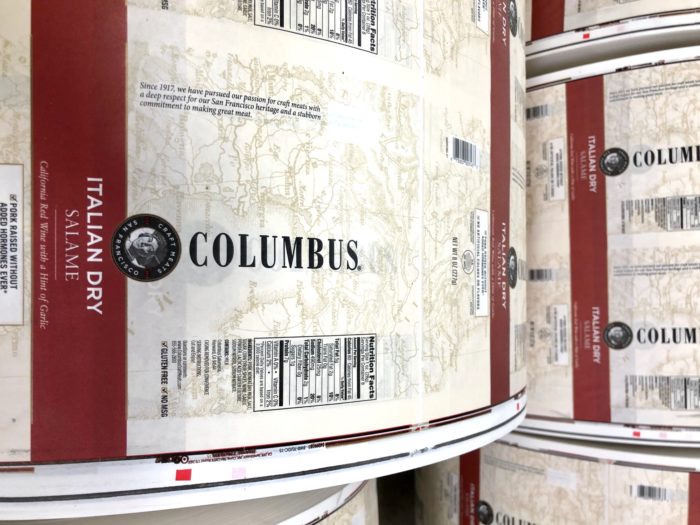
Whether it’s Safeway, Whole Foods, or Sonoma Market, food labels start with artwork that moves onto large rolls of paper and ends up here, as labels ready to apply to the package, in this case, Columbus Dry Salame.
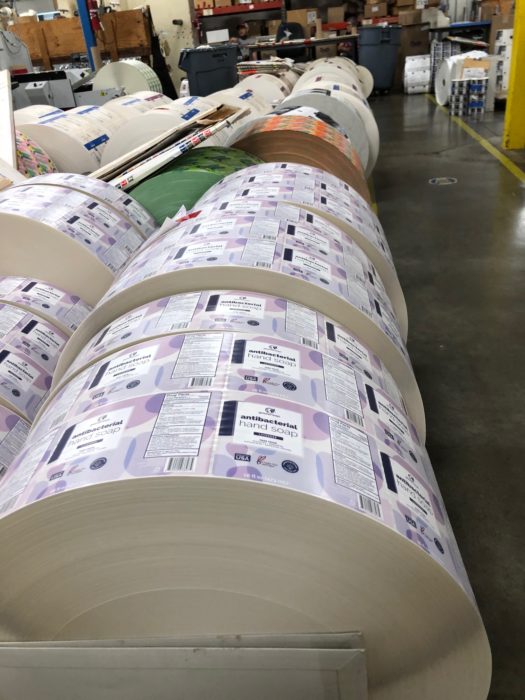
Here’s another example, in this case, many thousands of labels of a familiar brand of hand soap headed to Costco.
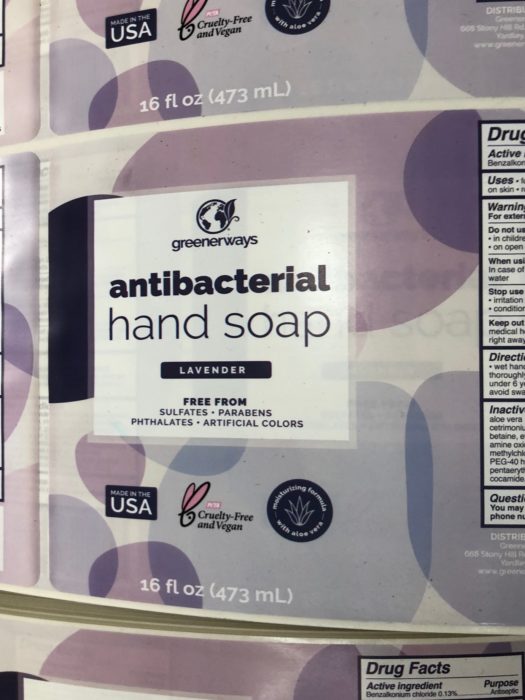
And a close-up of the hand soap label.
Bottling: after printing and processing, the labels make their way to the bottling line…
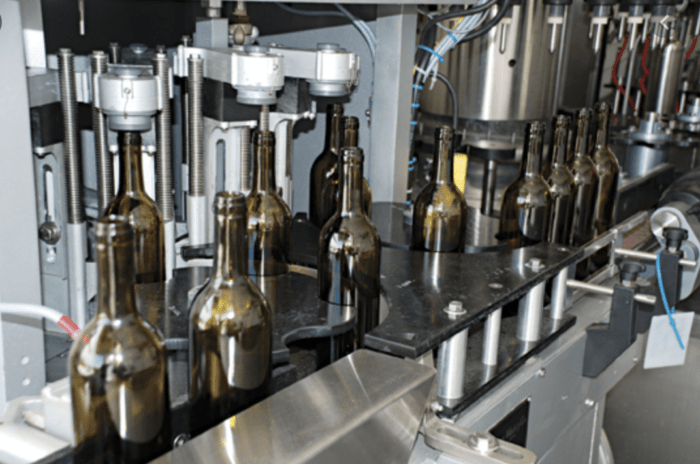
At the bottling line, new empty wine bottles are cleaned, ‘sparged’ with an inert food-grade gas which remove all oxygen, and then filled with wine.
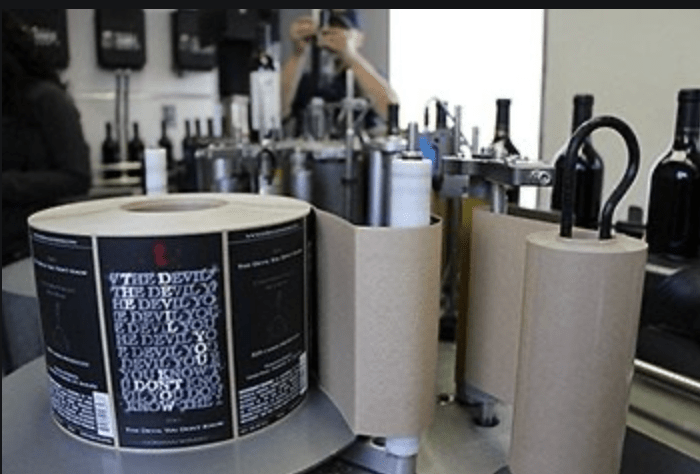
After wine, cork, and capsule, the cut and spooled labels are applied to the wine bottles.
Video – of finished cases exit the bottling line
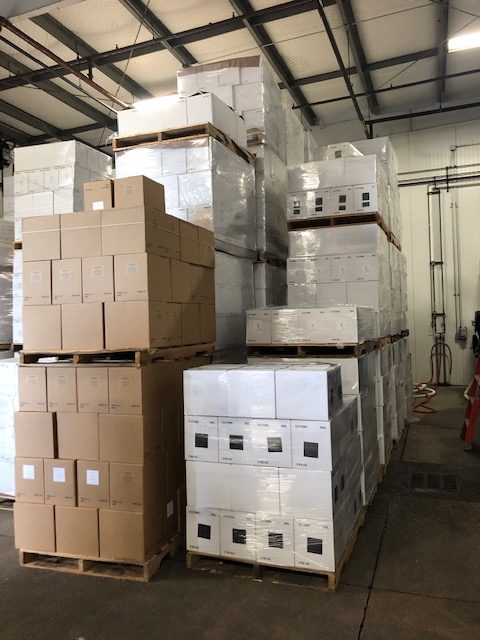
Palletized and stretch-wrapped pallets of wine head to the chilled fulfillment warehouse, and eventually to your home! In 20 short months, from harvest to finished product, your deep dark inky red wine is ready for delivery.
In other news around Sonoma – chickens, frittata, tacos, fresh produce, recipes, sourdough, art, walnut trees, and more:
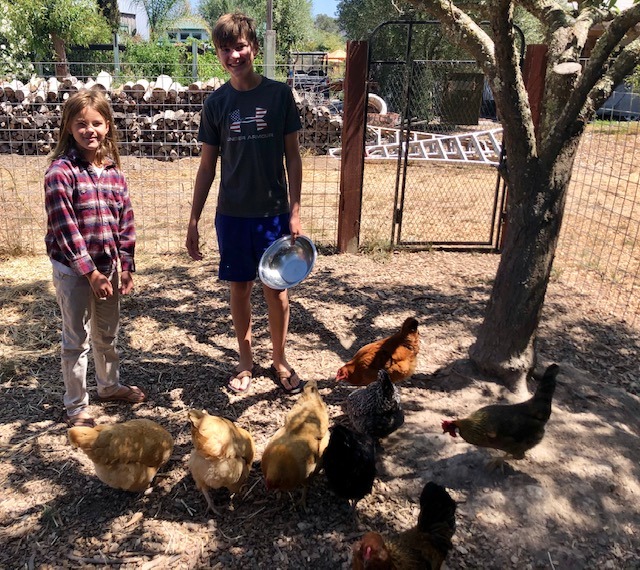
Neighborhood kids visit Hydeout Sonoma and the Dysfunctional Family chicken coop during a home-schooling exercise.
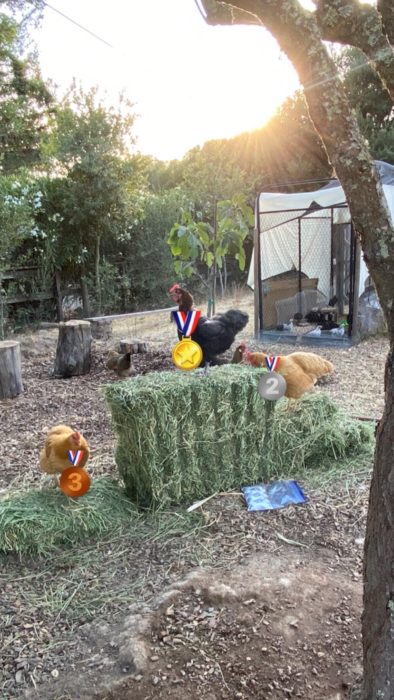
On top of an alfalfa bale, Buff wins bronze, Orpington wins silver, and Henny Penny wins gold.
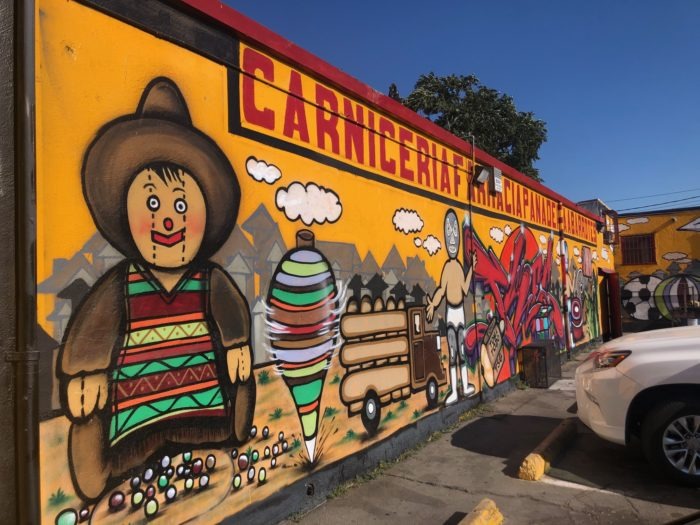
My personal favorite place to buy fresh-made corn “Azteca style” tortillas. Use navigation to find it!
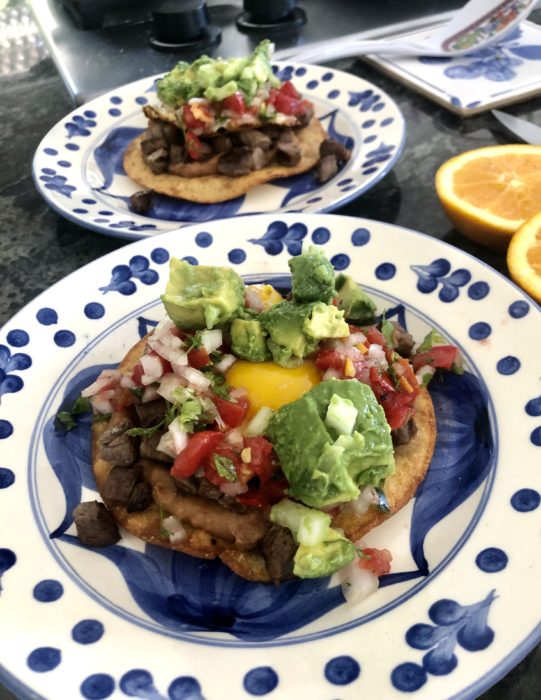
Enjoying our homemade farm fresh tacos – brings a brief pause to the endless fires and virus isolation – here’s a good taco recipe
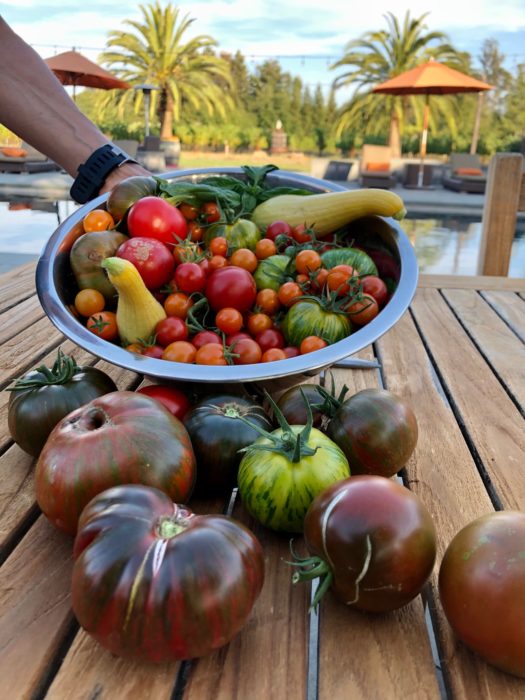
More mid-August produce from Hydeout Sonoma – this year’s various Zebra tomatoes are the clear winners – the green zebra is one this year’s favorites – learn more about heirloom green zebras
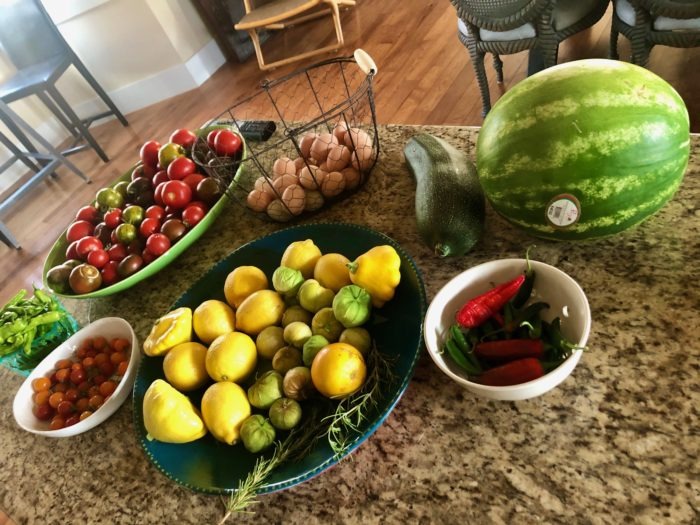
Hydeout Sonoma grew all the food in this photo…except one item. Can you guess? Where’s Waldo? (Yeh, it’s the watermelon). My favorite squash is the Pattypan. Small, sweet, few seeds, entirely edible with little waste – try growing some of your own Pattypans.
But wait, there’s more…
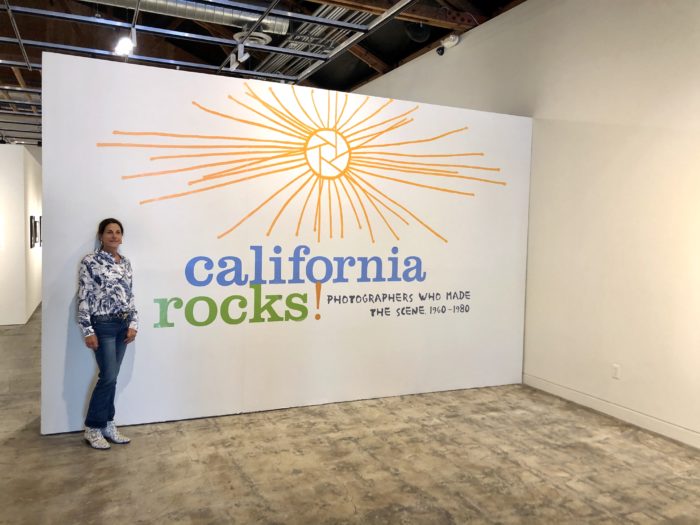
The Sonoma Valley Museum of Art launched a terrific new show, “california rocks’ just as the virus shut down Sonoma. This is a fantastic collection of photographs from many of the best rock shows in the Bay Area during the 70’s, from the Cow Palace, Winterland, Day-on-the-Green, and many more – see it online here: Sonoma Valley Museum of Art – ‘California Rocks”
Fires, again!
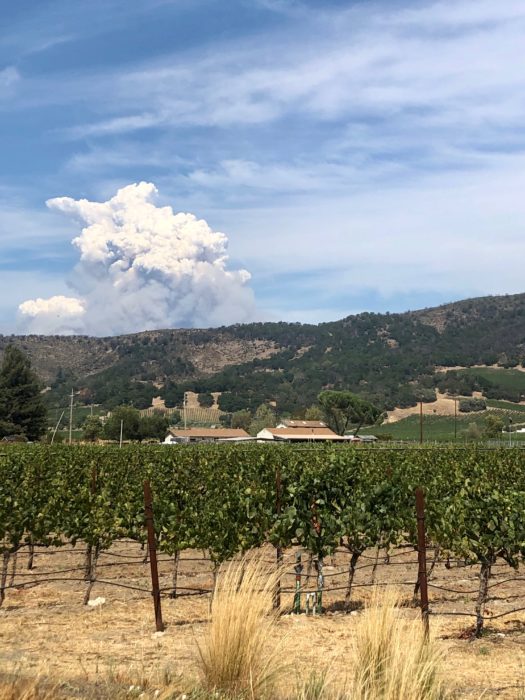
Oh no, here we go again. Last time it was the wind and downed power lines, this time it was ferocious lighting strikes, a rarity in NorCal. This was the start of it, as viewed from Hydeout looking east over Arrowhead Mountain toward Napa Valley over the hill.
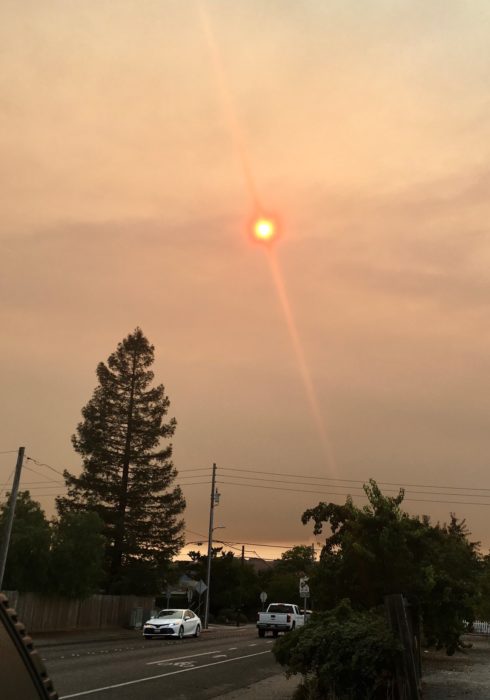
And a few days later…this is a view of the Hennessey / Soda Canyon LNU complex fire in Napa, as viewed around noon from the Hydeout in Sonoma.
80-year old Walnut trees harvested for fine furniture:
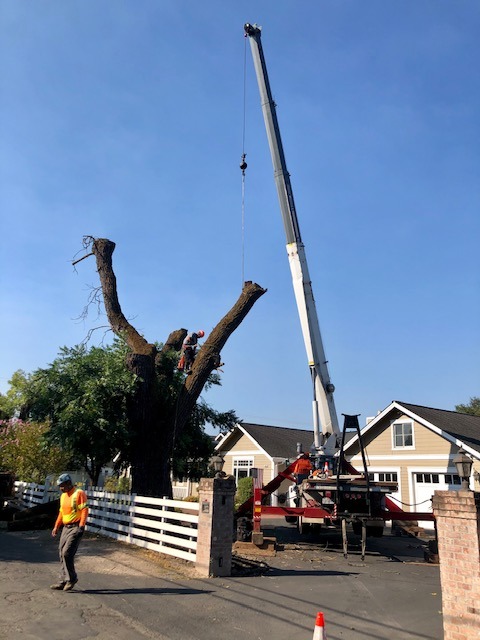
A friend and neighbor down the street prepares to take down two huge and dying 80-year old Walnut trees…
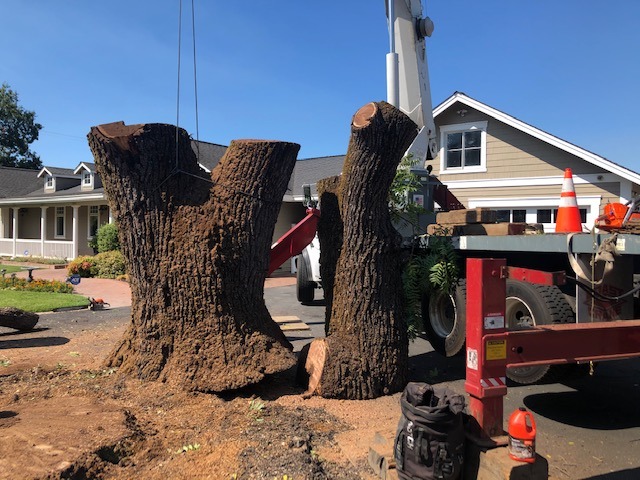
In a few short hours, the crew has the bulk of the tree on the ground. This piece was estimated to weigh in excess of 3 tons.
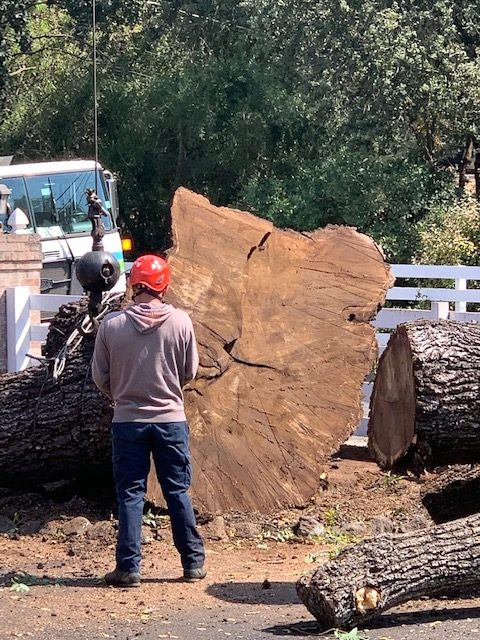
Large pieces of exotic Walnut will easily make in excess of $100,000 of furniture. These particular raw chunks will be slabbed on a huge band saw and dried for 3-5 years at my friend Evan Shively’s mill in Marshall – go to this website and watch this incredible drone video – Evan Shively’s famous wood mill in Marshall, called “Arborica”

This very heavy 20-disc hydraulic-ram implement is for sale. Reply with best offer, let’s make a deal!
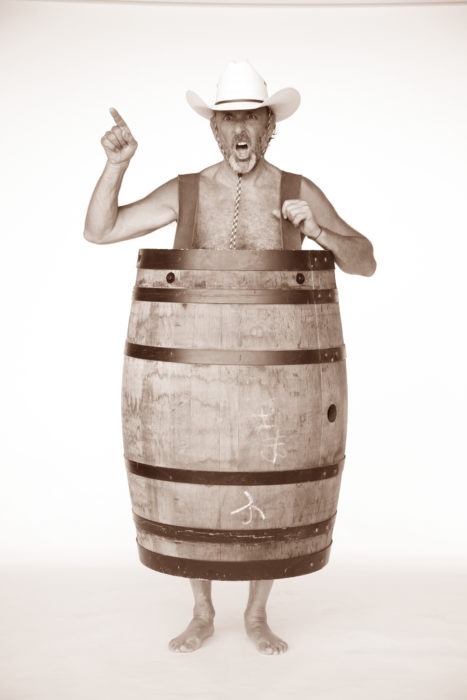
Some weird naked cowboy in a wine barrel snuck into this blog post. Thank you artist, renaissance man, and good friend Jock McDonald – see his website here – https://www.jockmcdonald.com

Jun 3, 2020 | Sonoma, Sonoma Farming, Vineyard, Wine
Hydeout Sonoma was selected by one of the arms of the historic Sebastiani wine family to return two iconic vineyards to their former glory. But it almost takes a secret Sonoma decoder ring to explain the vaunted family history, players, vineyards, and wines. More on that later. Let’s start with the work in process…
“Los Liones” vineyard block: Hydeout Sonoma was tasked with the complete renovation of this famous vineyard. Here is an abbreviated one-year pictorial essay following the reborn “Los Liones” vineyard, from raw land to completed vineyard:
“Stone Fruit Square” block: We then cast our eyes on the equally iconic “Stone Fruit Square” vineyard just east of downtown Sonoma at the intersection of Lovall Valley Road and Gehricke Road. This 25-year old quadrilateral-trained Cabernet vineyard was once a part of the renowned ‘Cherryblock’ vineyard. Now, a piece of the famed ‘block’ has been segregated away and re-named “Stone Fruit Square” (this is August’s terrific play on words!). This fruit is also destined for the “Gehricke” ‘Upper Eastside’ label.
Now, the rest of the story…
Don and Nancy Sebastiani are the 3rd generation owners of the “Los Liones” vineyard. Their children, Donny, August, and Mia all have their hands in interesting wine country ventures. Fruit from the “Los Liones” vineyard once went into a small production red wine called Subterra. Mia’s husband, Kendrick Coakley, along with his local friends, made a beautiful red wine from the “Los Liones” block. When 3Badge CFO Keith Casale handed me a bottle of Subterra, I opened it with some noteworthy Silicon Valley execs who have impeccable wine cred. They joined me in becoming immediate customers of Subterra.
But old age took down the original 1960’s era “Los Liones” vineyard and a replanting plan was set in motion last year (as you read about above). In parallel, we shifted the farming of the “Stone Fruit Square” vineyard from commercial mechanized farming to hand-cultivated farming. We intend to deliver deeper darker fruit as a result. August is the founder of 3Badge Beverage Corp. which is located in the former ‘firehouse’ at the corner of Broadway and Patten and the company “3Badge” is named in honor of family members who once held positions in the police and fire departments. Fruit from the “Los Liones” and “Stone Fruit Square” vineyard blocks will be combined under the Gehricke label as a ‘vineyard designate’ called “Upper East Side” (as both vineyards are located in the swanky upper eastside neighborhood of Sonoma town).
Hydeout Sonoma will continue to develop and farm these iconic vineyard blocks. And we’ll do our best to bring forth fruit that will assure that the “Gehricke” ‘Upper East Side’ vineyard designates continue their iconic reputation.
Additional vineyard notes (for those who just can’t get enough technical info):
“Los Liones” vineyard:
- Plant type – Ubervine from Novavine
- Variety – Cabernet Sauvignon
- Clone: VCR 198.1 (proprietary selection from Vivai Cooperativo Raucedo via Foundation Plant Material Services at UC Davis)
- Rootstock: 110R (berlandieri x rupestris, medium vigor, loves hillside gravelly soils)
- Vine architecture: bi-lateral cordon (moving toward cane-and-spur in year +/- 5)
- Farming: 100% organic, irrigated during youth, moving toward deficit irrigation
“Stone Fruit Square” vineyard:
- Planting – old school 1960’s plant canopy and spacing
- Variety – Cabernet Sauvignon
- Clones: Various
- Rootstock: St George (‘terra rosa’ volcanic soil)
- Vine architecture: quadrilateral cordon
- Farming: 100% organic, deficit irrigated and/or dry farmed depending on the year
@gehrickewines
#gehricke
#gehrickewines
A final thought: We are in a time of terrible upset in our great country. It seems as if everything is politicized and polarized. We at Hydeout Sonoma takes very seriously the issues we are all confronting. But our blog post is not the forum for otherwise welcome debate. Still, we hope for health, peace, and liberty for all.
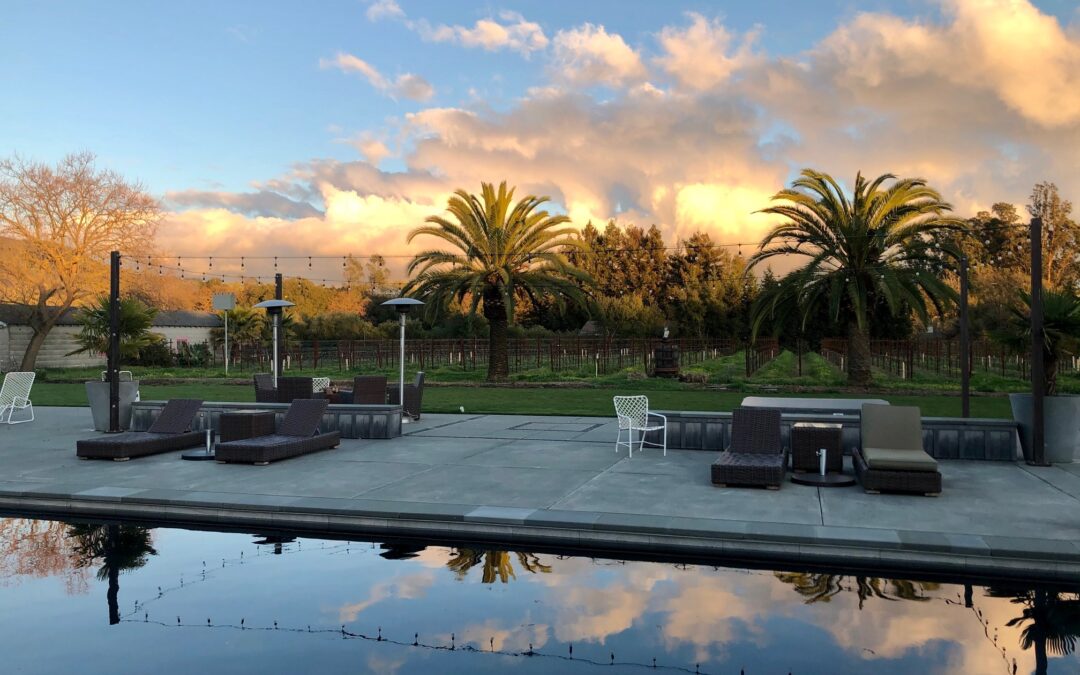
Mar 11, 2020 | Sonoma, Sonoma Farming, Wine
Sonoma farm life is explored, scroll through to be entertained, learn, and laugh…or just waste 10 minutes before your next ‘bored & working from home’ Corona virus zoom video conference.
Vineyard pruning in March
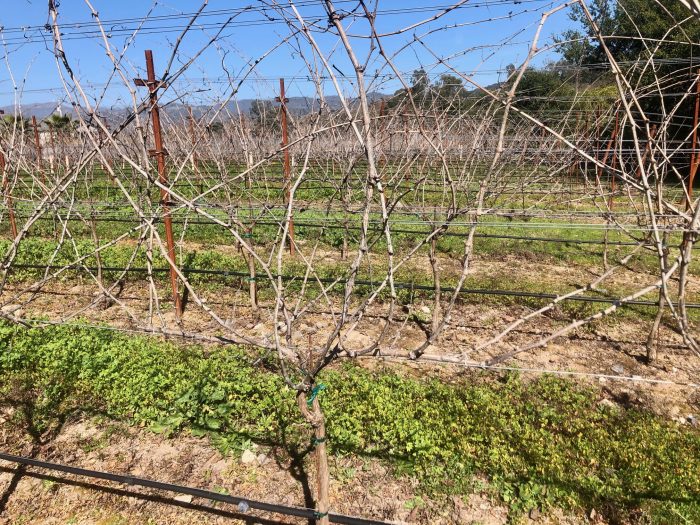
Here is an example of a grapevine waiting to be pruned. As a deciduous plant, it drops all of it’s leaves in winter and translocates carbs and nutrients from the woody shoots back into the roots. In spring, those nutrients push back into the new shoots supporting growth.
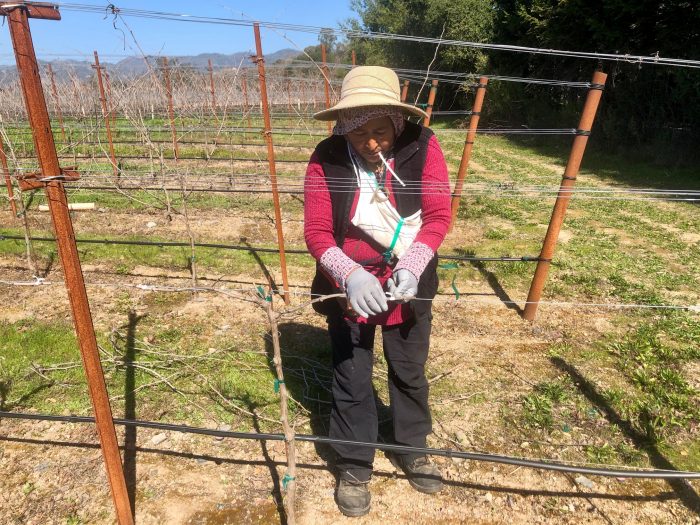
Our beloved Emma, a world class grapevine pruner at work.
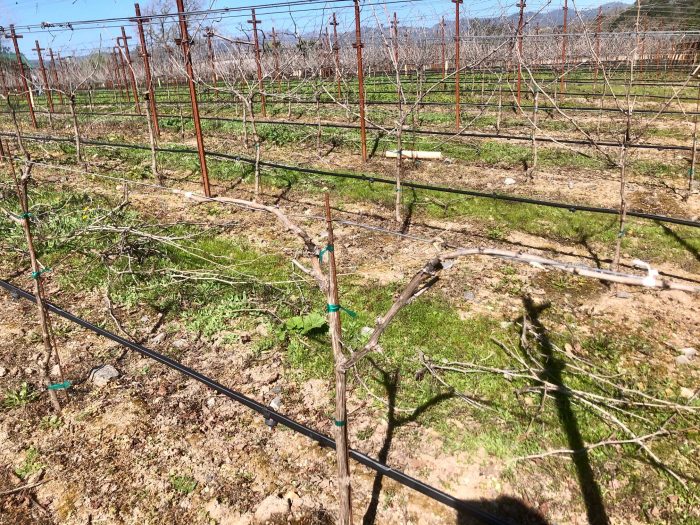
The pruned and tied vine. Note all the previous year’s wood has been removed (on the ground waiting for mowing into in-place compost), and only the ‘new wood’ has been tied horizontally to the training wire (the wire above the black drip hose). Picture this being done thousands of times per acre and you have some sense of the labor and expense of vineyard farming. Sonoma farm life
Gardening
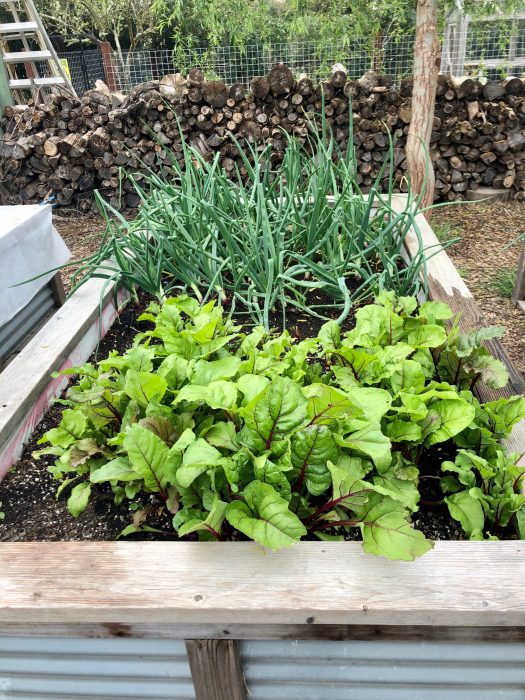
One of our raised beds – Beets in the foreground, red onion sets in the background, about 4 weeks from harvest, around April 10th.
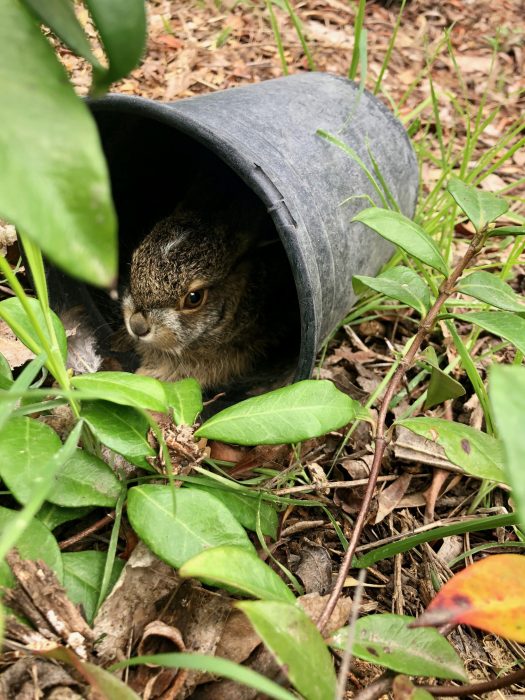
The bunnies have been reproducing especially rapidly this year. This baby here has possibly lost its mother and is temporarily hiding in this empty plant container till dark. Always interesting to follow which animal populations expand or shrink depending upon conditions. We’ve always had the usual gophers, deer, rabbit, and fox, and recently a family of weasels under the rock pile. Sonoma farm life
Rescuing a downed Red Tail Hawk, sadly this story doesn’t end well…
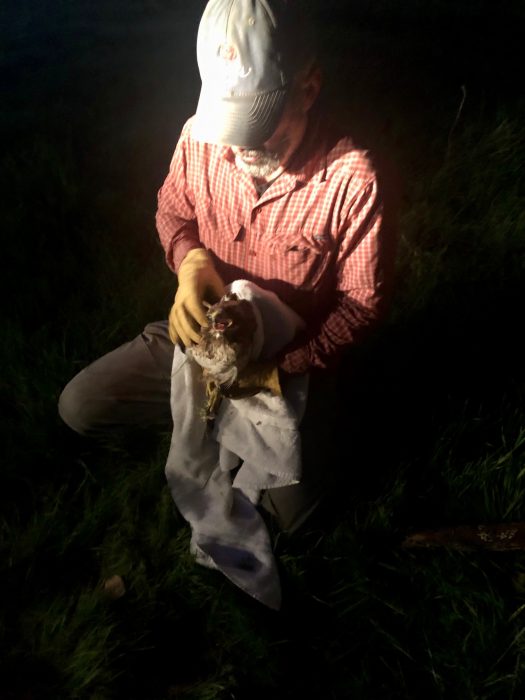
I was on a walk at dusk down by the Arroyo Seco creek and came upon an injured and very confused Red Tail Hawk. Called my friend Chris Melanćon, a trained falconer, and later that evening we captured and boxed the bird to keep it safe and warm overnight.
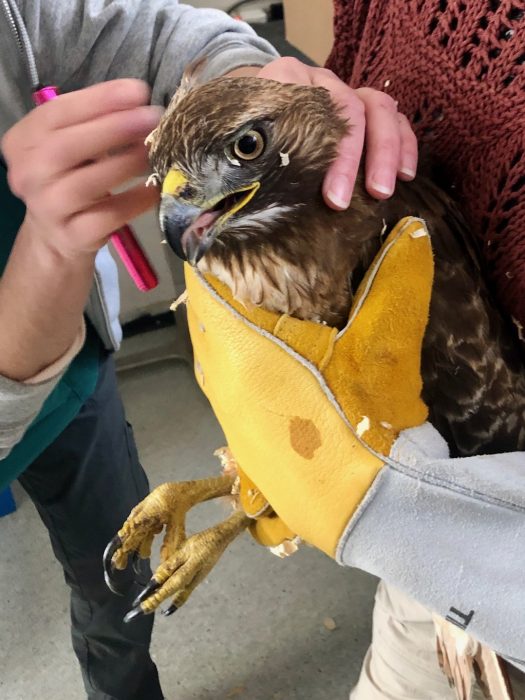
Skilled nurses carefully checked the health and condition.
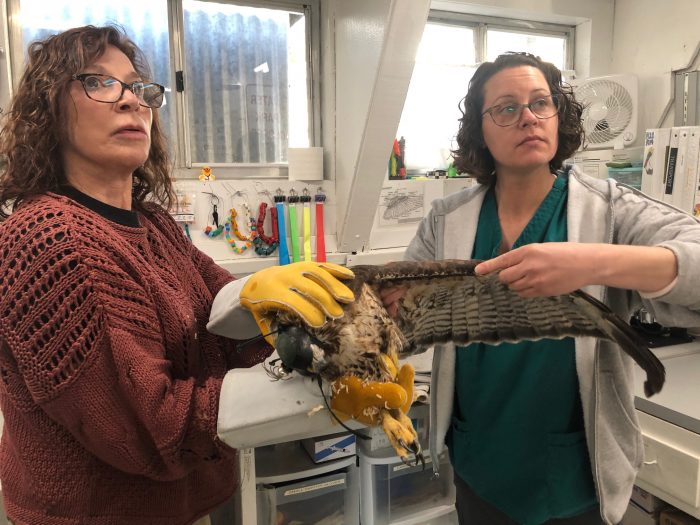
And checked all it’s vitals, including wings of course.
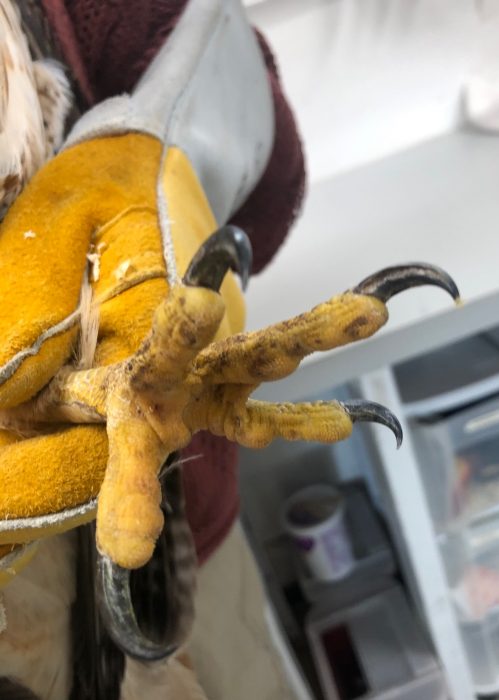
You can see these raptors have quite the extended reach and very sharp claws to grab their prey while in flight.
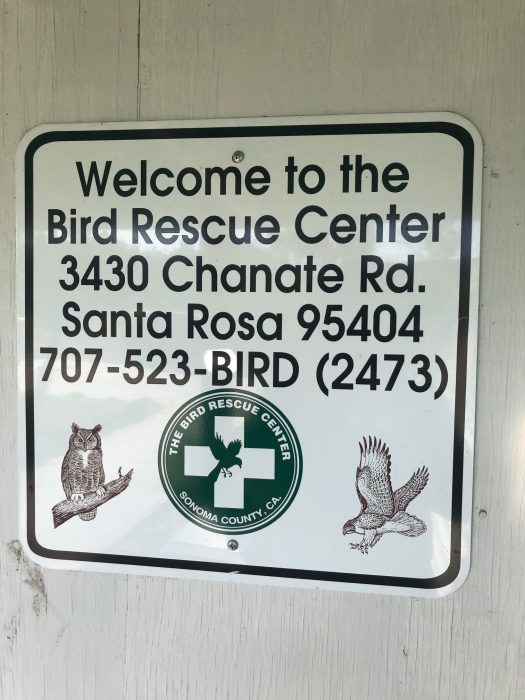
Sadly, our bird survived only a few days at the Rescue Center. Apparently it had suffered a neurologic injury and just could not pull through. We did our best. Nature at work. Sonoma farm life
Willow tree cuttings
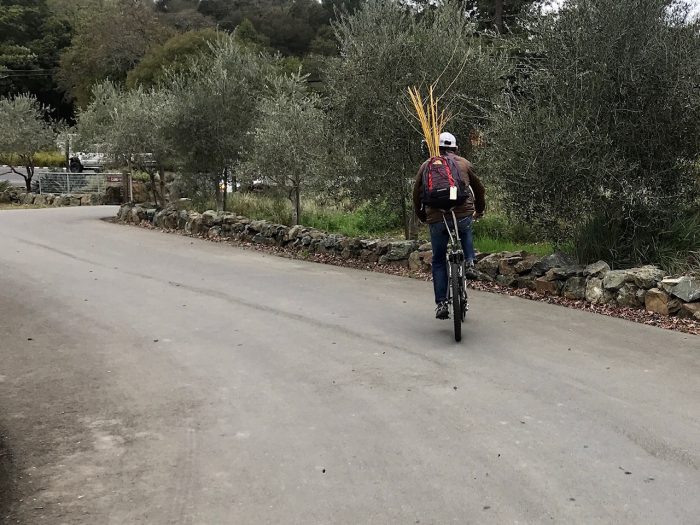
Found myself in Healdsburg on a bike ride and met up with a fellow winemaker who has a rare yellow-barked willow. Genus Salix. Could not pass up the chance to fill my backpack with cuttings which in the case of all willows are quite easily transplanted.
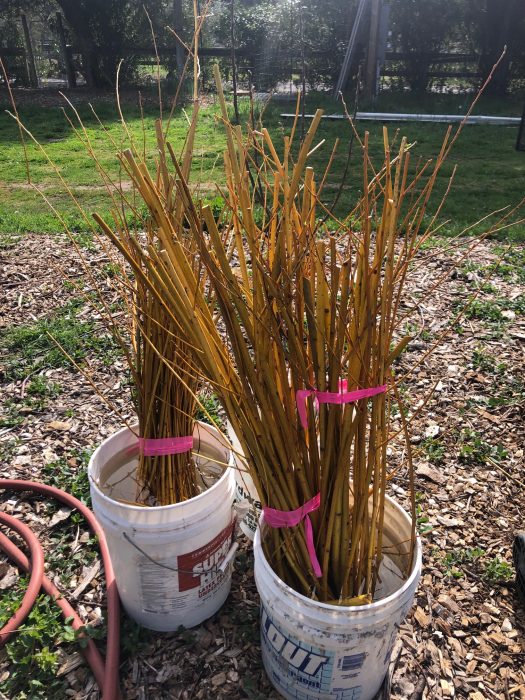
These willow cuttings are soaking before going into the ground. Willows will sprout roots from almost any woody cutting. They are fast growers too. The roots are very invasive so it’s a bad idea to plant them near pipes and sidewalks. But they are an excellent plant almost anywhere else for instant shade. And other plants and trees will naturally fill in under them as the willows age-out and die-off later.
Mowing the native grasses
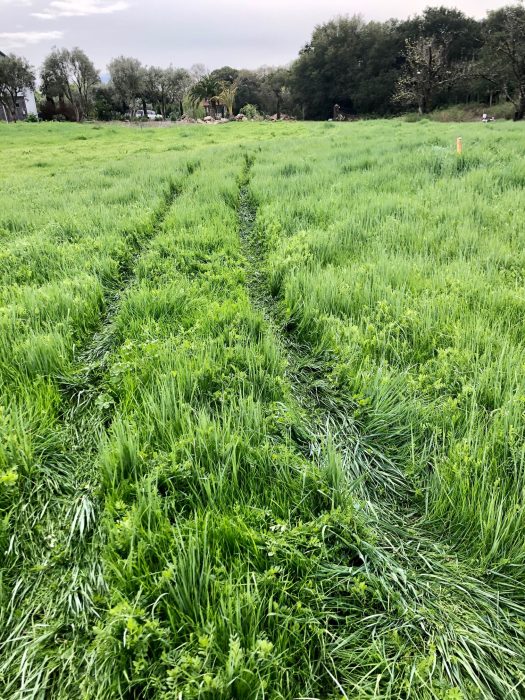
Before: This is a good time of year to give the grasses and forbs (pasture) a quick haircut.
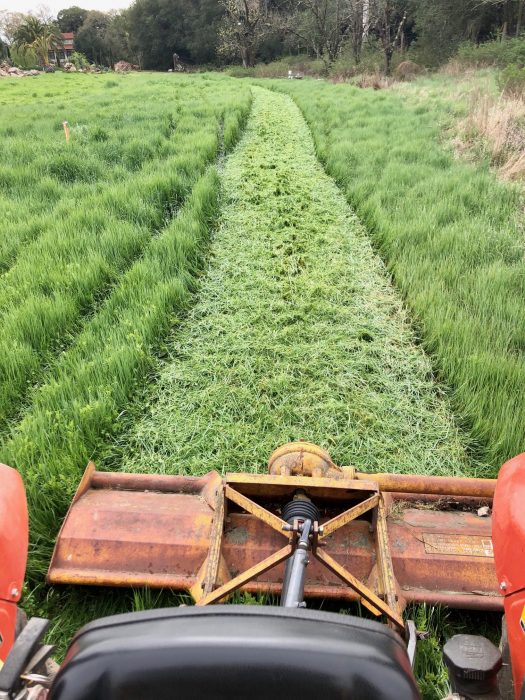
After: The first cut-pass with my old 1950’s Mott flail mower mounted onto the PTO of our Kubota tractor. The smell of the cut grass is intoxicating. I do this to create a dry and comfortable walking path out in the pastures, leaving the remainder to grow high in the spring.
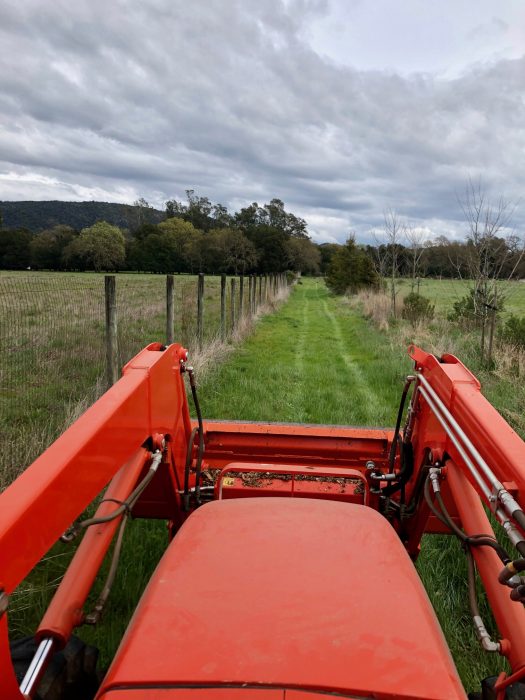
This is view of our north fence line getting ready to mow.
The old Mott flail mower occasionally enters a complaint!
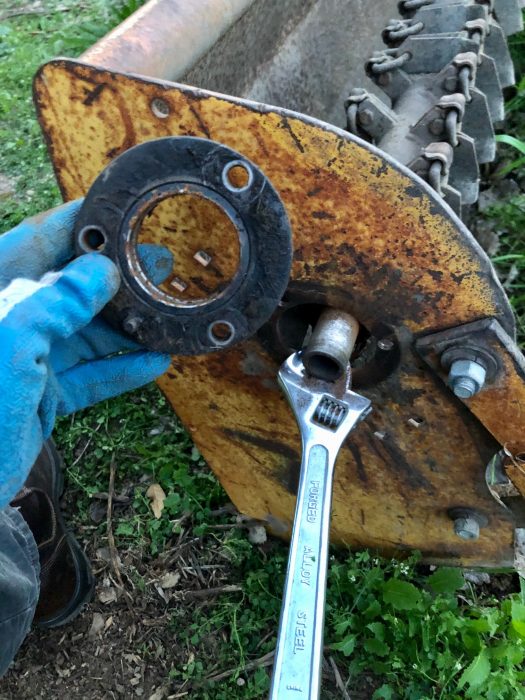
The flail mower takes a real beating. After some heavy use, on occasion a bearing will burn out. You can see here that the bearings are completely gone. Had to learn how to replace these. I’ve heard many stories of grass fires starting when the bearing fails and the red-hot ball-bearings fly out on to dry grass. It’s best to be safe and mow while the grass is still green.
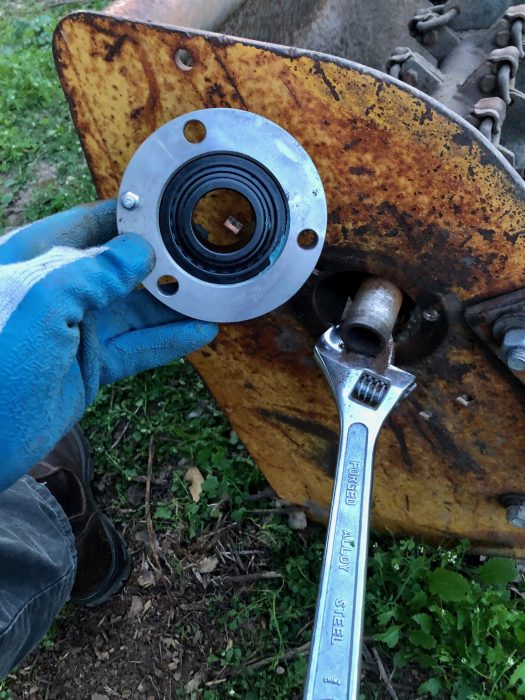
About to install this new bearing mount on the cutting shaft. $250 and 2 hours later.
Distilling wine into ethanol to make grape-based Brandy and Grappa
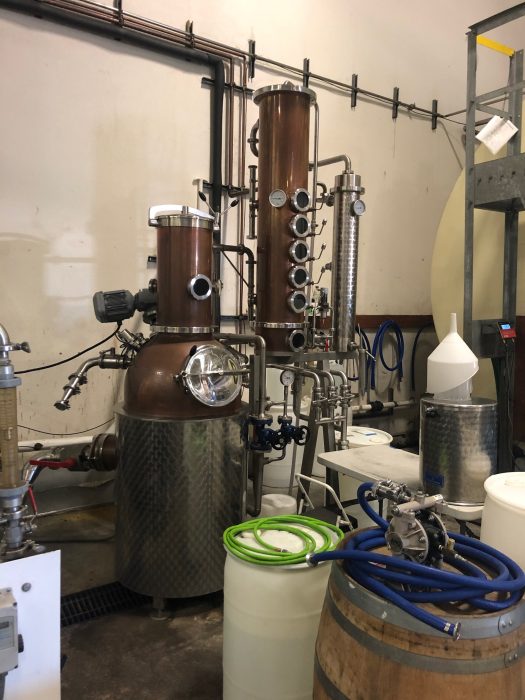
Start off with a half-ton of what’s left in the wine press after pressing, called pomace, and end up after distilling with several gallons of 186 proof pure distilled ethanol. Then that is diluted back with pure water to reach the targeted brandy/grappa alcohol level 35% to 60% by volume (ABV). Then it’s aged in oak or whisky barrels or flavored with fruit as desired. And then bottled and labeled. The story of grappa.
Chickens and Auto Solar Chicken Door
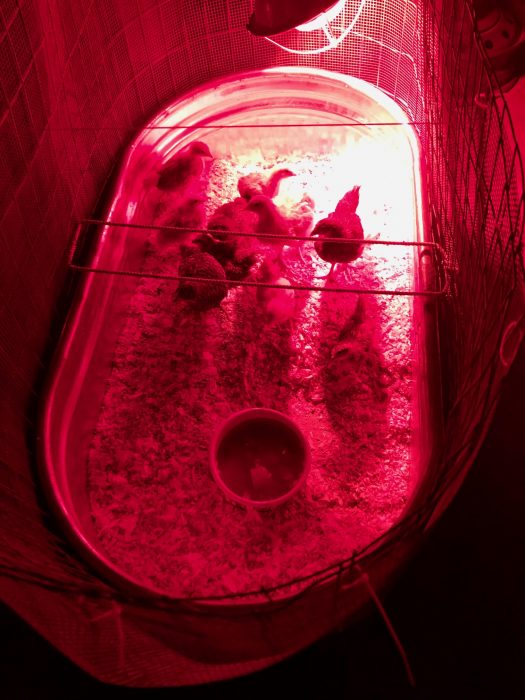
Last month I added eleven new chicks seen here in the incubator. Just add chicks, water, and food, and presto…in about 21 weeks all those hens will be laying 2 eggs every 3 days!
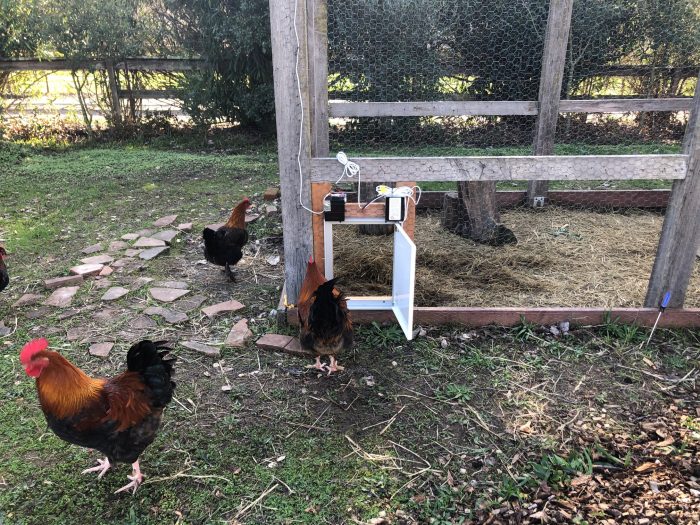
This is an automatic chicken door. How does it work? A solar panel (on the coop roof, not in view) charges a 12v battery (top left of the white door), the battery operates the motor (top right of door), and a light sensor (not in view) opens the door at first light and closes it a dark. There is also a ‘last chance’ feature where the door re-opens for one minute 5 minutes after dark. The chickens quickly adjust to the routine and religiously get themselves inside before the door closes for the second time at dusk. You can find this excellent equipment at Chicken Doors. Sonoma farm life
Mulching
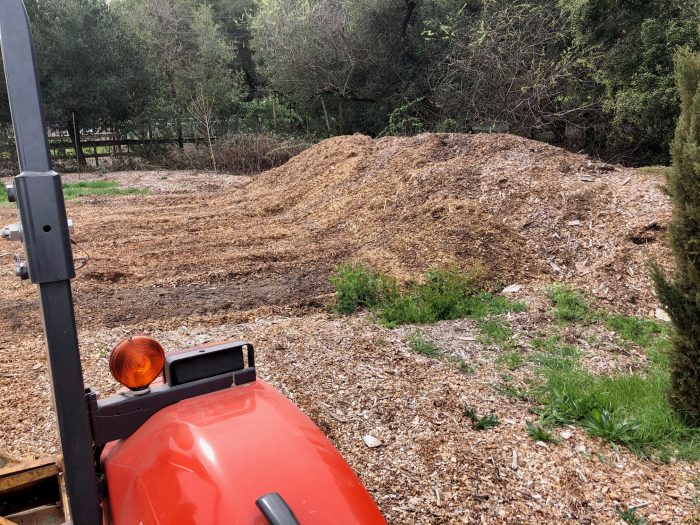
Local tree trimming companies are more than happy to have a free place to drop off chipped tree mulch. This pile represents about 20 truckloads. This material is very useful around the farm; especially with roses and plants that require moist soil and little weed competition.
Mustard blooms
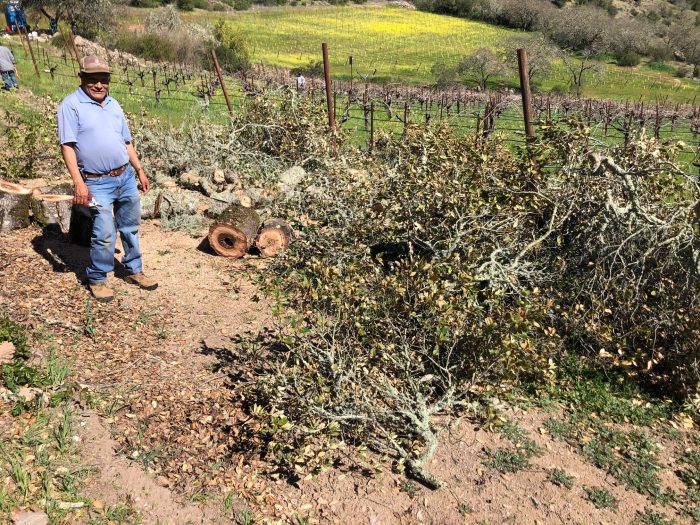
In one of our client vineyards, a tree fell in the recent strong winds, so we got out the chainsaws and went at it. In the background you can see a new Cabernet vineyard block we planted last Fall, and the mustard coming up nicely.
Hot air ballooning
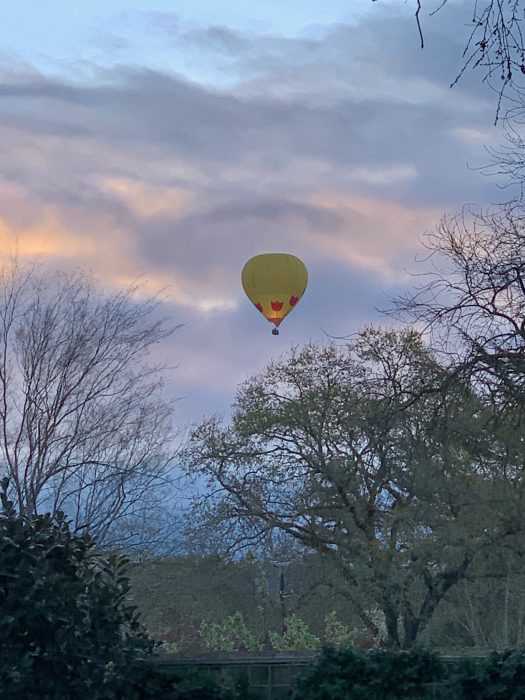
In Sonoma, you can look up pretty much any early morning and see the tourists enjoying their hot air ballon rides. The air is very still and it’s pretty cold out too. That’s why they keep the coffee hot! This one, the well-recognized ‘red tulips’, is from Napa Valley Balloons.
The end of the day on the farm
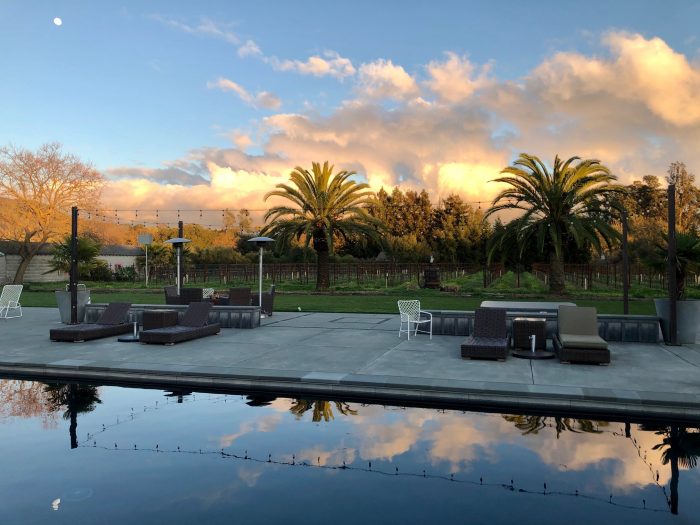
The sun begins to set on another day on the farm, as the low clouds glow and the full moon rises.
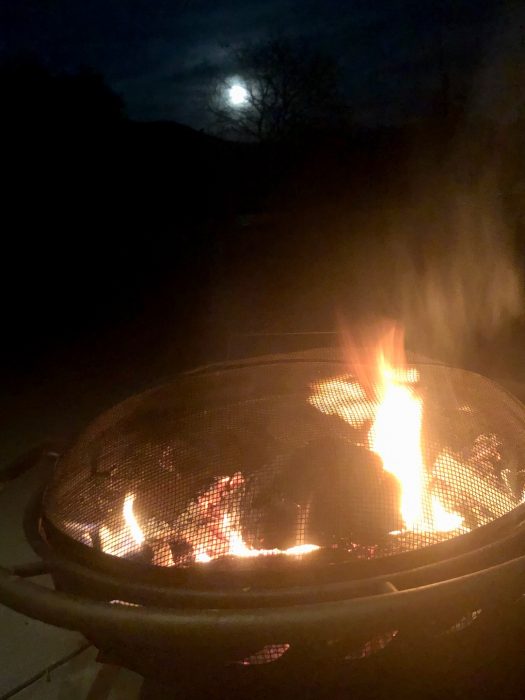
It’s a real treat to have friends over for an authentic wood fire, only possible on cold damp winter nights, and no matter what, we use the spark arrester. Why? Everyone in Sonoma is rightfully fearful of loose sparks starting a wild fire.
Just for fun: The biggest grape and wine convention in the United States, the Unified Grape and Wine Symposium
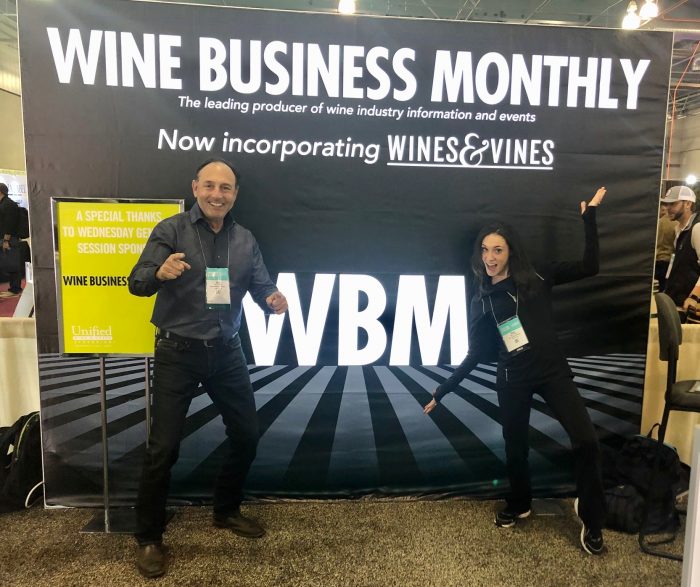
One of the most popular trade magazines in our industry, “Wine Business Monthly“ always has an informative booth. Assistant Editor Stacy Briscoe welcomes me to the show. This is also the ‘go-to’ website for all things grapes and wine – buy/sell grapes or bulk wine, learn about the latest trends, etc.
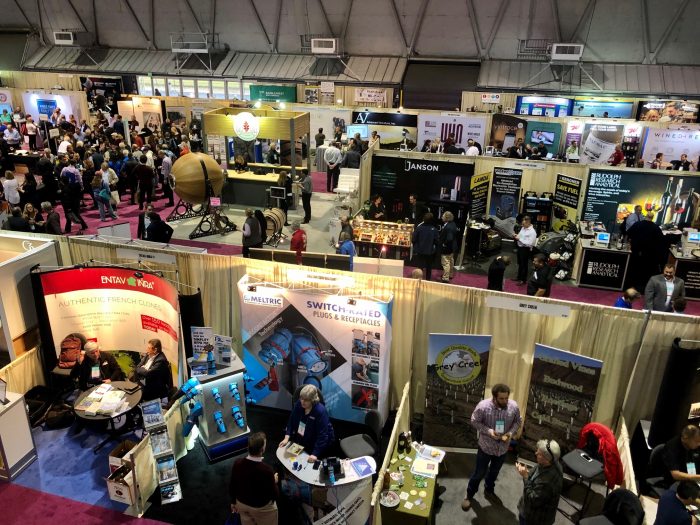
The convention covers every imaginable aspect – from vineyard farming tools to heavy equipment, to the latest in drone-applied sprays. And in wine, everything from bottles, corks, and capsules, to pumps and valves, and laboratory testing.
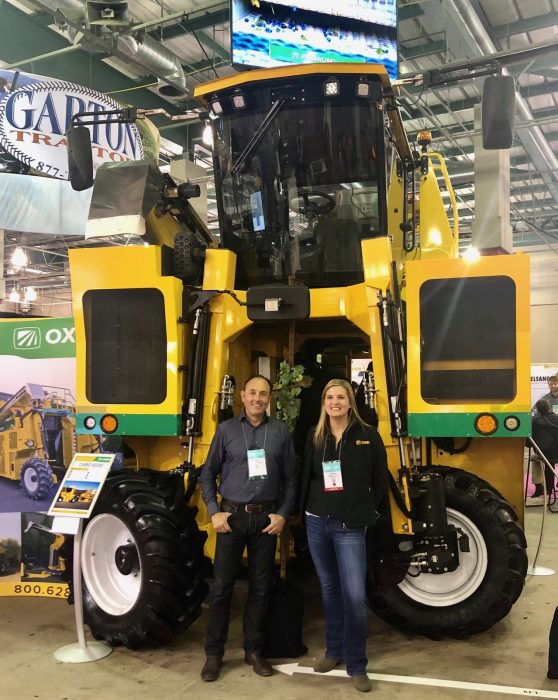
One of my favorite activities each year is to visit the ‘large equipment’ yard. I’ll never have a use for this million-dollar computer-controlled self-propelled mechanical harvester/sorter…but it’s really interesting to stand next to it and walk around (and inside). This behemoth can harvest upwards of 25 tons an hour, with one operator! Equal to many dozens of laborers and people-hours.











































